All about Women
96 element(s) found
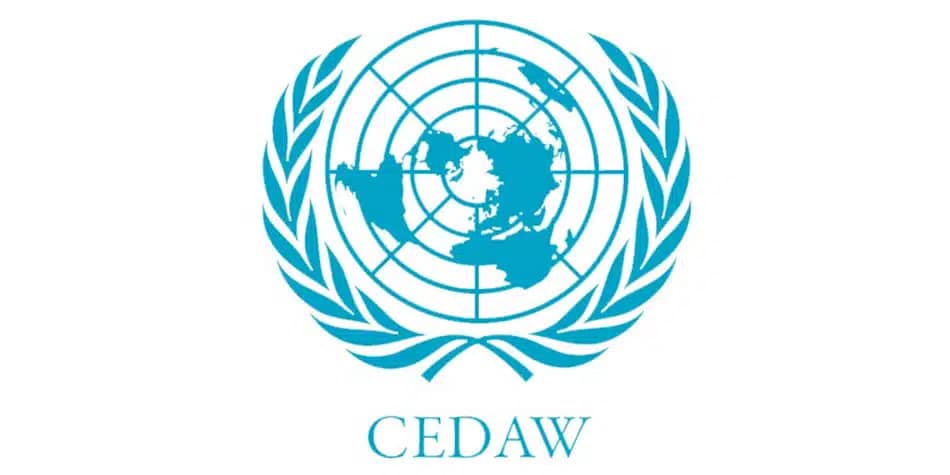
Article(s)
Abolitionist advocacy at the 91st session of the CEDAW Committee and side event during the 59th session of the Human Rights Council.
By The World Coalition Against the Death Penalty, on 15 January 2026
The World Coalition Against the Death Penalty (World Coalition) actively advocated during the 91st session of the Committee on the Elimination of Discrimination against Women (CEDAW), held in Geneva from 16 June to 4 July 2025, to denounce gender-based discrimination in the application of the death penalty in Afghanistan and Thailand.
2026
Gender
Warning: Undefined variable $tmp in /home/worldcoa/coalition2020/wp-content/themes/WCADP/template-parts/contents.php on line 27
Women
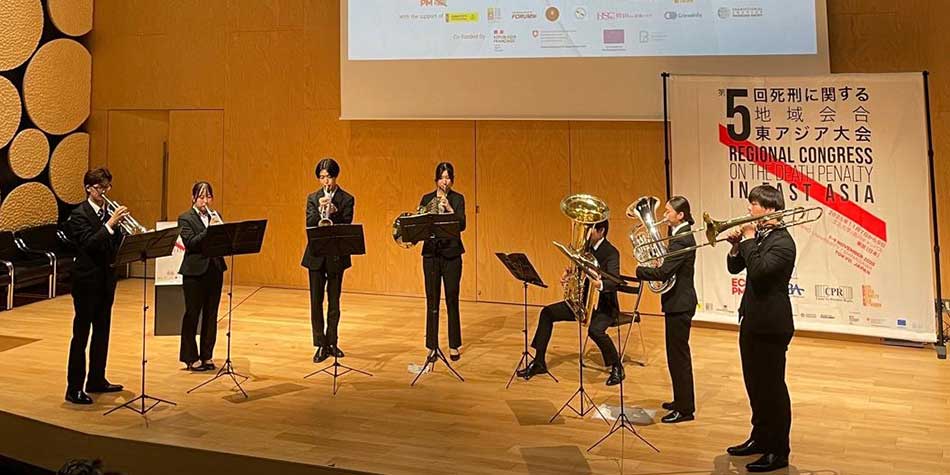
Article(s)
Renewed momentum for abolition: a look back at the 5th Regional Congress in Tokyo
By World Coalition against the death penalty, on 11 December 2025
From 7 to 9 November 2025, Tokyo hosted the 5th Regional Congress on the Death Penalty in East Asia, organized by ECPM (Ensemble contre la peine de mort/ Together Against the Death Penalty), in partnership with the Centre for Prisoners’ Rights (CPR), the Japan Federation of Bar Associations (JFBA) and the Asian Death Penalty Abolition […]
2025
Gender
Warning: Undefined variable $tmp in /home/worldcoa/coalition2020/wp-content/themes/WCADP/template-parts/contents.php on line 27
Trend Towards Abolition
Women

Article(s)
No longer invisible: UN shines light on reality of women on death row
By Amy Berquist, on 28 November 2025
It was an early opportunity to mark World Day Against the Death Penalty, which The Advocates for Human Rights (The Advocates) and other members of the World Coalition Against the Death Penalty (World Coalition) observe annually on 10 October. On 7 October 2025, the UN Human Rights Council adopted a resolution on the “question of […]
2025
Gender
Warning: Undefined variable $tmp in /home/worldcoa/coalition2020/wp-content/themes/WCADP/template-parts/contents.php on line 27
Women
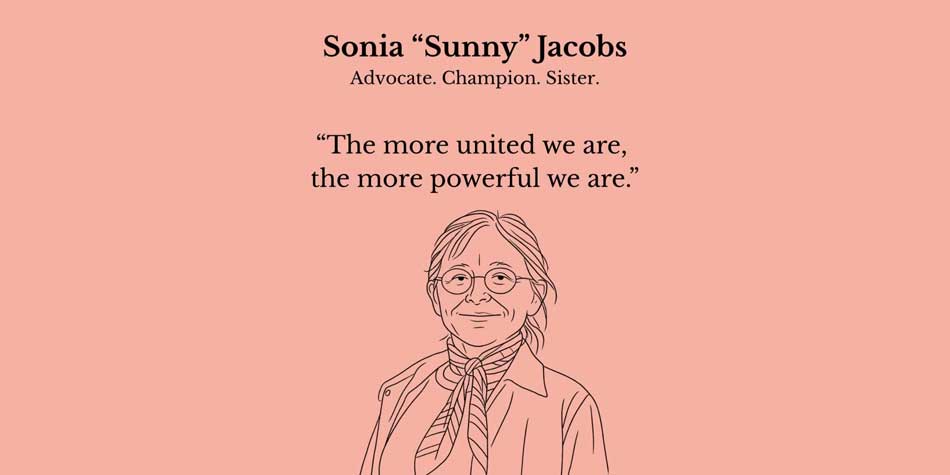
Article(s)
Sunny Scholarship Travel Fund: Giving a voice to formerly incarcerated women
By The World Coalition Against the Death Penalty, on 20 November 2025
“Everyone faces challenges in life, and you can either spend the rest of your life looking back, or you can make the decision to keep moving forward.” Sunny Jacobs (1947–2025) Facing gender-based discrimination : the importance of testimony Like Sunny, a tireless abolitionist activist who tragically passed away on 3 June 2025, the voices of […]
2025
Gender
Warning: Undefined variable $tmp in /home/worldcoa/coalition2020/wp-content/themes/WCADP/template-parts/contents.php on line 27
Women
Document(s)
Best Practices in Defending Women and Gender Minorities
By Nathalie Greenfield, with critical chapters written by Bahar Mirhosseni, Sandra Babcock, and Jessica Sutton, on 17 October 2025
2025
Legal Representation
Warning: Undefined variable $liste_type_doc in /home/worldcoa/coalition2020/wp-content/themes/WCADP/template-parts/contents-document.php on line 21
Warning: Undefined variable $liste_themes in /home/worldcoa/coalition2020/wp-content/themes/WCADP/template-parts/contents-document.php on line 35
Gender
Women
Warning: Undefined variable $tag_langue in /home/worldcoa/coalition2020/wp-content/themes/WCADP/template-parts/contents-document.php on line 85
More details See the document
The document offers guidance for legal defenders on how to approach cases involving women and gender minorities, with an emphasis on gender-sensitive practice.
It covers methods for integrating intersectional analysis (race, class, gender identity, etc.) into legal strategy, ethical considerations in representation, trauma-aware interviewing, narrative construction, and team building.
- Document type Legal Representation
Warning: Undefined variable $liste_pays in /home/worldcoa/coalition2020/wp-content/themes/WCADP/template-parts/contents-document.php on line 107
- Themes list Gender / Women
Warning: Undefined variable $lien_langue in /home/worldcoa/coalition2020/wp-content/themes/WCADP/template-parts/contents-document.php on line 127

Article(s)
The death penalty and drug policy: abolitionist perspectives at the Harm Reduction International conference
By The World Coalition Against the Death Penalty, on 19 June 2025
From April 27 to 30, 2025, the Harm Reduction International (HRI) conference in Bogotá brought together several hundred activists, researchers and human rights defenders committed to drug policies based on health, rights and justice.
2025
Gender
Warning: Undefined variable $tmp in /home/worldcoa/coalition2020/wp-content/themes/WCADP/template-parts/contents.php on line 27
Women
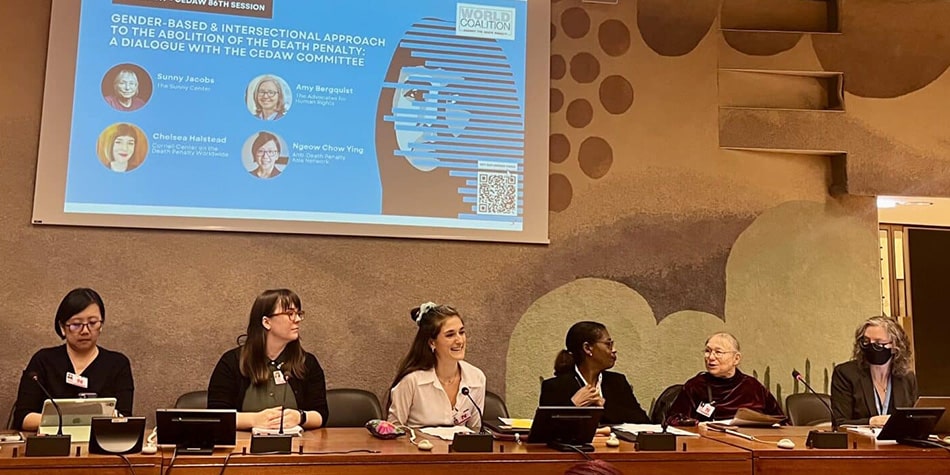
Article(s)
Tribute to Sunny Jacobs by the Gender Working Group
By The World Coalition Against the Death Penalty, on 6 June 2025
It is with great sadness that the Gender Working Group of the World Coalition Against the Death Penalty pays tribute to Sonia “Sunny” Jacobs, a tireless advocate and an inspiration to us all.
2025
Gender
Warning: Undefined variable $tmp in /home/worldcoa/coalition2020/wp-content/themes/WCADP/template-parts/contents.php on line 27
Women

Article(s)
For a world free from the shadows of the gallows
By World Coalition Against the Death Penalty, on 14 April 2025
On 8 April 2025, Amnesty International published its annual report on the state of the death penalty worldwide. Amnesty International’s monitoring shows that with continued advocacy, it is just a matter of time before the death penalty will be fully abolished globally.
2025
China
Clemency
Cruel, Inhuman and Degrading Treatment and Punishment
Democratic People's Republic of Korea
Gender
Warning: Undefined variable $tmp in /home/worldcoa/coalition2020/wp-content/themes/WCADP/template-parts/contents.php on line 27
Innocence
Intellectual Disability
Iran (Islamic Republic of)
Iraq
Japan
Malaysia
Mental Illness
Moratorium
Saudi Arabia
Terrorism
Trend Towards Abolition
United States
Viet Nam
Women
Zambia
Zimbabwe
Document(s)
Amicus Curiae brief in support of the Pan African Lawyers Union’s request for an Advisory Opinion on the Compatibility of the Death Penalty with the African Charter on Human and Peoples’ Rights
By The Advocates for Human Rights, on 10 April 2025
2025
NGO report
Warning: Undefined variable $liste_type_doc in /home/worldcoa/coalition2020/wp-content/themes/WCADP/template-parts/contents-document.php on line 21
Warning: Undefined variable $liste_themes in /home/worldcoa/coalition2020/wp-content/themes/WCADP/template-parts/contents-document.php on line 35
Cruel, Inhuman and Degrading Treatment and Punishment
Drug Offenses
Fair Trial
Gender
Legal Representation
Warning: Undefined variable $tmp in /home/worldcoa/coalition2020/wp-content/themes/WCADP/template-parts/contents-document.php on line 32
Moratorium
Murder Victims' Families
Terrorism
Trend Towards Abolition
Women
Warning: Undefined variable $tag_langue in /home/worldcoa/coalition2020/wp-content/themes/WCADP/template-parts/contents-document.php on line 85
More details See the document
In this submission in support of the Pan African Lawyers Union, the amici explain that the death penalty per se is an arbitrary deprivation of life, in violation of Article 4 of the African Charter, because the weight of the evidence shows that the death penalty is not necessary to achieve the stated purpose of reducing crime and as a penalty implicating human rights under the Charter it is disproportionate to the benefits it seeks to capture.
- Document type NGO report
Warning: Undefined variable $liste_pays in /home/worldcoa/coalition2020/wp-content/themes/WCADP/template-parts/contents-document.php on line 107
- Themes list Cruel, Inhuman and Degrading Treatment and Punishment / Drug Offenses / Fair Trial / Gender / Legal Representation / Moratorium / Murder Victims' Families / Terrorism / Trend Towards Abolition / Women
Warning: Undefined variable $lien_langue in /home/worldcoa/coalition2020/wp-content/themes/WCADP/template-parts/contents-document.php on line 127
Document(s)
Death sentences and executions in 2024
By Amnesty International, on 8 April 2025
2025
NGO report
Warning: Undefined variable $liste_type_doc in /home/worldcoa/coalition2020/wp-content/themes/WCADP/template-parts/contents-document.php on line 21
Warning: Undefined variable $liste_themes in /home/worldcoa/coalition2020/wp-content/themes/WCADP/template-parts/contents-document.php on line 35
Clemency
Cruel, Inhuman and Degrading Treatment and Punishment
Gender
Innocence
Intellectual Disability
Mental Illness
Moratorium
Terrorism
Trend Towards Abolition
Women
Warning: Undefined variable $tag_langue in /home/worldcoa/coalition2020/wp-content/themes/WCADP/template-parts/contents-document.php on line 54
Warning: Undefined variable $lien_langue in /home/worldcoa/coalition2020/wp-content/themes/WCADP/template-parts/contents-document.php on line 55
aresfafr
More details See the document
This report covers the judicial use of the death penalty for the period January to December 2024. Amnesty International’s monitoring shows an increase by 32% in recorded executions compared to 2023. This does not include the thousands of people believed to have been executed in China, as well as in North Korea and Viet Nam, also believed to have resorted to executions extensively. For the second consecutive year, executing countries reached the lowest number on record.
- Document type NGO report
Warning: Undefined variable $liste_pays in /home/worldcoa/coalition2020/wp-content/themes/WCADP/template-parts/contents-document.php on line 107
- Themes list Clemency / Cruel, Inhuman and Degrading Treatment and Punishment / Gender / Innocence / Intellectual Disability / Mental Illness / Moratorium / Terrorism / Trend Towards Abolition / Women
- Available languages أحكام وعمليات الإعدام2024 فيCondenas a muerte y ejecuciones 2024مجازات اعدام در خاورمیانه و آفریقای شمالی ۲۰۲۴Condamnations à mort et exécutions 2024

Article(s)
Judicial Influence on Death Penalty Abolition: Global Legal Perspectives at the Biennial High-Level Panel
By Sandra Deballe, on 28 March 2025
On February 25, 2025, the biennial high-level panel on the death penalty was held at the United Nations Human Rights Council in Geneva, under the theme “Contribution of the Judiciary to the Advancement of Human Rights and the Question of the Death Penalty.”
2025
Drug Offenses
Fair Trial
Gender
Warning: Undefined variable $tmp in /home/worldcoa/coalition2020/wp-content/themes/WCADP/template-parts/contents.php on line 27
Moratorium
Public Opinion
Trend Towards Abolition
Women
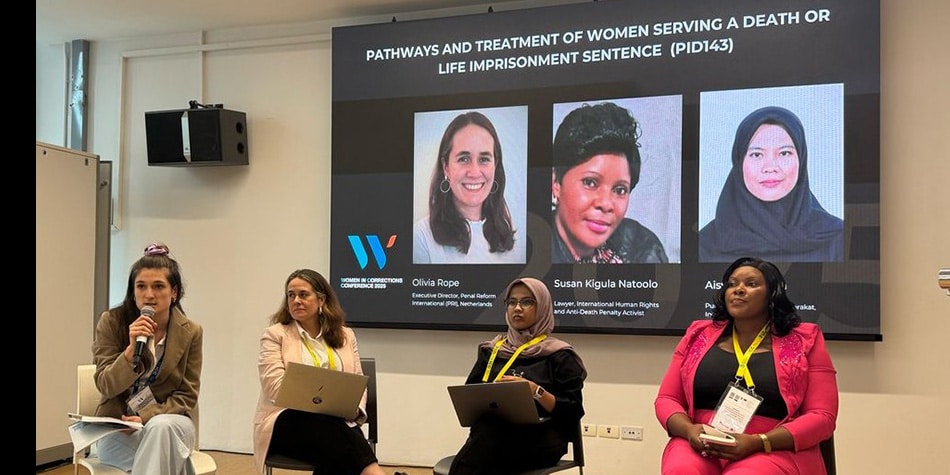
Article(s)
Advocacy for recognition of the reality of women sentenced to death at the first Women in Corrections conference
By the World Coalition Against the Death Penalty, on 21 March 2025
A World Coalition Against the Death Penalty (World Coalition) delegation participated in the first Women in Corrections Conference (WICC), held in Bangkok, Thailand, in February 2025.
2025
Gender
Warning: Undefined variable $tmp in /home/worldcoa/coalition2020/wp-content/themes/WCADP/template-parts/contents.php on line 27
Women
Document(s)
From poverty to punishment: Examining laws and practices which criminalise women due to poverty or status worldwide
By Penal Reform International, Women Beyond Walls, on 17 March 2025
2025
NGO report
Warning: Undefined variable $liste_type_doc in /home/worldcoa/coalition2020/wp-content/themes/WCADP/template-parts/contents-document.php on line 21
Warning: Undefined variable $liste_themes in /home/worldcoa/coalition2020/wp-content/themes/WCADP/template-parts/contents-document.php on line 35
Death Row Conditions
Drug Offenses
Fair Trial
Gender
Intellectual Disability
Legal Representation
Mental Illness
Murder Victims' Families
Trend Towards Abolition
Women
Warning: Undefined variable $tag_langue in /home/worldcoa/coalition2020/wp-content/themes/WCADP/template-parts/contents-document.php on line 85
More details
Warning: Trying to access array offset on value of type bool in /home/worldcoa/coalition2020/wp-content/themes/WCADP/template-parts/contents-document.php on line 97
Warning: Trying to access array offset on value of type bool in /home/worldcoa/coalition2020/wp-content/themes/WCADP/template-parts/contents-document.php on line 99
Warning: Trying to access array offset on value of type bool in /home/worldcoa/coalition2020/wp-content/themes/WCADP/template-parts/contents-document.php on line 99
Download [ - 0 Ko ]
The report exposes how laws and policies disproportionately criminalise women due to their socio-economic status and vulnerabilities, and calls for urgent reforms to stop the criminalisation of women for poverty, survival strategies and gendered norms.
- Document type NGO report
Warning: Undefined variable $liste_pays in /home/worldcoa/coalition2020/wp-content/themes/WCADP/template-parts/contents-document.php on line 107
- Themes list Death Row Conditions / Drug Offenses / Fair Trial / Gender / Intellectual Disability / Legal Representation / Mental Illness / Murder Victims' Families / Trend Towards Abolition / Women
Warning: Undefined variable $lien_langue in /home/worldcoa/coalition2020/wp-content/themes/WCADP/template-parts/contents-document.php on line 127
Document(s)
The Death Penalty for Drug Offences: Global Overview 2024
on 12 March 2025
2025
NGO report
Warning: Undefined variable $liste_type_doc in /home/worldcoa/coalition2020/wp-content/themes/WCADP/template-parts/contents-document.php on line 21
Warning: Undefined variable $liste_pays in /home/worldcoa/coalition2020/wp-content/themes/WCADP/template-parts/contents-document.php on line 40
China
Warning: Undefined variable $liste_themes in /home/worldcoa/coalition2020/wp-content/themes/WCADP/template-parts/contents-document.php on line 35
Cruel, Inhuman and Degrading Treatment and Punishment
Democratic People's Republic of Korea
Drug Offenses
Fair Trial
Gender
Indonesia
Iran (Islamic Republic of)
Iraq
Legal Representation
Malaysia
Moratorium
Pakistan
Saudi Arabia
Singapore
Trend Towards Abolition
Viet Nam
Women
Warning: Undefined variable $tag_langue in /home/worldcoa/coalition2020/wp-content/themes/WCADP/template-parts/contents-document.php on line 85
More details See the document
The Death Penalty for Drug Offences: Global Overview 2024 report provides updates on legislative, policy and practical developments related to the use of capital punishment for drug offences, a practice which is a clear violation of international human rights and drug control standards. This report presents an analysis of key developments, with a focus on analysing and disseminating available figures and trends on drug-related executions and death sentences.
- Document type NGO report
- Countries list China / Democratic People's Republic of Korea / Indonesia / Iran (Islamic Republic of) / Iraq / Malaysia / Pakistan / Saudi Arabia / Singapore / Viet Nam
- Themes list Cruel, Inhuman and Degrading Treatment and Punishment / Drug Offenses / Fair Trial / Gender / Legal Representation / Moratorium / Trend Towards Abolition / Women
Warning: Undefined variable $lien_langue in /home/worldcoa/coalition2020/wp-content/themes/WCADP/template-parts/contents-document.php on line 127
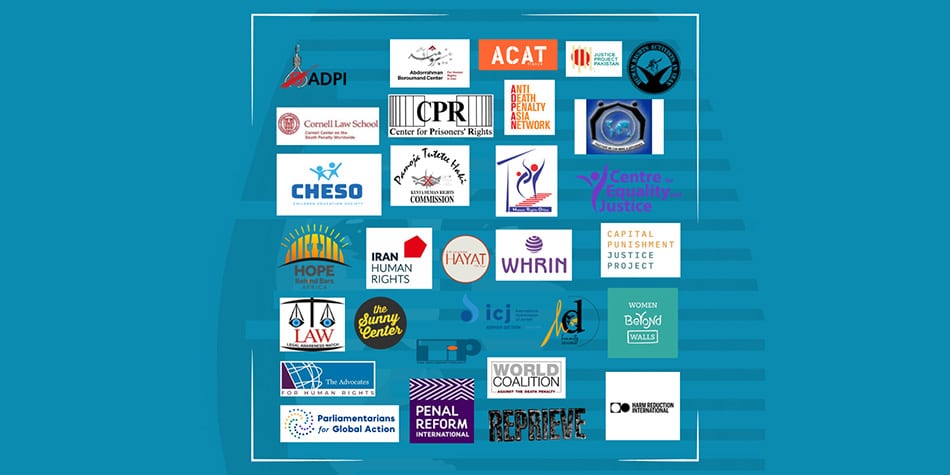
Article(s)
Joint Statement on the Rights of Women and Gender Minorities Facing the Death Penalty
By the World Coalition Against the Death Penalty, on 8 March 2025
On this International Women’s Day, and every day, we want to recognize and center the stories, voices, and expertise of women and gender minorities/gender diverse persons who languish behind bars in racist, classist, and patriarchal legal systems around the world.
2025
Gender
Warning: Undefined variable $tmp in /home/worldcoa/coalition2020/wp-content/themes/WCADP/template-parts/contents.php on line 27
Women
Document(s)
Annual Report on the Death Penalty in Iran 2024
on 20 February 2025
2025
NGO report
Warning: Undefined variable $liste_type_doc in /home/worldcoa/coalition2020/wp-content/themes/WCADP/template-parts/contents-document.php on line 21
Warning: Undefined variable $liste_themes in /home/worldcoa/coalition2020/wp-content/themes/WCADP/template-parts/contents-document.php on line 35
Clemency
Cruel, Inhuman and Degrading Treatment and Punishment
Drug Offenses
Fair Trial
Gender
Intellectual Disability
Warning: Undefined variable $liste_pays in /home/worldcoa/coalition2020/wp-content/themes/WCADP/template-parts/contents-document.php on line 40
Iran (Islamic Republic of)
Juveniles
Legal Representation
Mental Illness
Murder Victims' Families
Women
Warning: Undefined variable $tag_langue in /home/worldcoa/coalition2020/wp-content/themes/WCADP/template-parts/contents-document.php on line 54
Warning: Undefined variable $lien_langue in /home/worldcoa/coalition2020/wp-content/themes/WCADP/template-parts/contents-document.php on line 55
fafr
More details See the document
The Report provides an in-depth analysis of death penalty trends in Iran 2024. It covers execution statistics, legislative frameworks, and the abolitionist movement, offering insights on how the international community can help reduce executions.
- Document type NGO report
- Countries list Iran (Islamic Republic of)
- Themes list Clemency / Cruel, Inhuman and Degrading Treatment and Punishment / Drug Offenses / Fair Trial / Gender / Intellectual Disability / Juveniles / Legal Representation / Mental Illness / Murder Victims' Families / Women
- Available languages گزارش سالانه اعدام در ایران؛ ۲۰۲۴Rapport annuel sur la peine de mort en Iran
Document(s)
Monitoring conditions of detention of prisoners sentenced to death: Practical Guide for NHRIs and NPMs.
By Ensemble contre la peine de mort (ECPM), on 16 January 2025
2025
NGO report
Warning: Undefined variable $liste_type_doc in /home/worldcoa/coalition2020/wp-content/themes/WCADP/template-parts/contents-document.php on line 21
Warning: Undefined variable $liste_themes in /home/worldcoa/coalition2020/wp-content/themes/WCADP/template-parts/contents-document.php on line 35
Cruel, Inhuman and Degrading Treatment and Punishment
Death Row Conditions
Fair Trial
Gender
Juveniles
Legal Representation
Women
Warning: Undefined variable $tag_langue in /home/worldcoa/coalition2020/wp-content/themes/WCADP/template-parts/contents-document.php on line 54
Warning: Undefined variable $lien_langue in /home/worldcoa/coalition2020/wp-content/themes/WCADP/template-parts/contents-document.php on line 55
fr
More details See the document
ECPM’s new guide provides NHRIs and NPMs with practical tools for assessing the conditions of detention of death row prisoners, emphasizing international human rights standards.
- Document type NGO report
Warning: Undefined variable $liste_pays in /home/worldcoa/coalition2020/wp-content/themes/WCADP/template-parts/contents-document.php on line 107
- Themes list Cruel, Inhuman and Degrading Treatment and Punishment / Death Row Conditions / Fair Trial / Gender / Juveniles / Legal Representation / Women
- Available languages Monitoring des conditions de détention des personnes condamnées à mort : Guide pratique des INDH et MNP
Document(s)
Women and the Death Penalty in Iran: A Gendered Perspective
By Iran Human Rights (IHRNGO), on 6 January 2025
2025
NGO report
Warning: Undefined variable $liste_type_doc in /home/worldcoa/coalition2020/wp-content/themes/WCADP/template-parts/contents-document.php on line 21
Warning: Undefined variable $liste_themes in /home/worldcoa/coalition2020/wp-content/themes/WCADP/template-parts/contents-document.php on line 35
Death Row Conditions
Gender
Warning: Undefined variable $liste_pays in /home/worldcoa/coalition2020/wp-content/themes/WCADP/template-parts/contents-document.php on line 40
Iran (Islamic Republic of)
Women
Warning: Undefined variable $tag_langue in /home/worldcoa/coalition2020/wp-content/themes/WCADP/template-parts/contents-document.php on line 85
More details See the document
This comprehensive report by Iran Human Rights (IHRNGO) explores the gendered dimensions of the death penalty in Iran, highlighting systemic inequalities, discriminatory laws, and societal factors that disproportionately affect women on death row. Between 2010 and 2024, at least 241 women were executed, with only 26% of cases officially reported. Many were sentenced under circumstances marked by domestic violence, coerced confessions, or lack of legal representation. The report underscores the urgent need for international advocacy to address these injustices and promote gender equality in Iran’s judicial system.
- Document type NGO report
- Countries list Iran (Islamic Republic of)
- Themes list Death Row Conditions / Gender / Women
Warning: Undefined variable $lien_langue in /home/worldcoa/coalition2020/wp-content/themes/WCADP/template-parts/contents-document.php on line 127
Document(s)
Qarchak Prison Report: Hell for Women and Children in Iran
By Iran Human Rights, on 10 December 2024
2024
NGO report
Warning: Undefined variable $liste_type_doc in /home/worldcoa/coalition2020/wp-content/themes/WCADP/template-parts/contents-document.php on line 21
Warning: Undefined variable $liste_themes in /home/worldcoa/coalition2020/wp-content/themes/WCADP/template-parts/contents-document.php on line 35
Cruel, Inhuman and Degrading Treatment and Punishment
Death Row Conditions
Warning: Undefined variable $liste_pays in /home/worldcoa/coalition2020/wp-content/themes/WCADP/template-parts/contents-document.php on line 40
Iran (Islamic Republic of)
Women
Warning: Undefined variable $tag_langue in /home/worldcoa/coalition2020/wp-content/themes/WCADP/template-parts/contents-document.php on line 85
More details See the document
Iran Human Rights (IHRNGO) has released a detailed report exposing the inhumane conditions at Qarchak Prison in Iran, a facility originally designed as a poultry farm. The prison detains over 2,000 women and children in overcrowded and unsanitary conditions, with a lack of healthcare, contaminated drinking water, and inadequate nutrition. Children, some born in the prison, are exposed to severe hardships, including unhygienic environments, insufficient food, and inadequate medical care, and are often separated from their mothers at the age of two.
The report also highlights the use of solitary confinement for women, including death row prisoners awaiting execution. These cells lack ventilation and basic facilities, exacerbating the psychological and physical suffering of detainees. Mothers detained with their children face additional challenges, including threats of separation and the absence of educational or recreational resources for their children.
IHRNGO calls for the immediate closure of Qarchak Prison and urges the international community to take action against these egregious human rights violations. This report underscores the urgent need to protect the dignity and rights of all prisoners, particularly the most vulnerable women and children.
- Document type NGO report
- Countries list Iran (Islamic Republic of)
- Themes list Cruel, Inhuman and Degrading Treatment and Punishment / Death Row Conditions / Women
Warning: Undefined variable $lien_langue in /home/worldcoa/coalition2020/wp-content/themes/WCADP/template-parts/contents-document.php on line 127

Article(s)
Abolitionist advocacy at the 89th CEDAW Session
By World Coalition Against the Death Penalty, on 2 December 2024
The 89th session of the Committee on the Elimination of Discrimination Against Women (CEDAW) took place in Geneva, Switzerland, from 7 to 25 October 2024.
2024
Gender
Warning: Undefined variable $tmp in /home/worldcoa/coalition2020/wp-content/themes/WCADP/template-parts/contents.php on line 27
Women
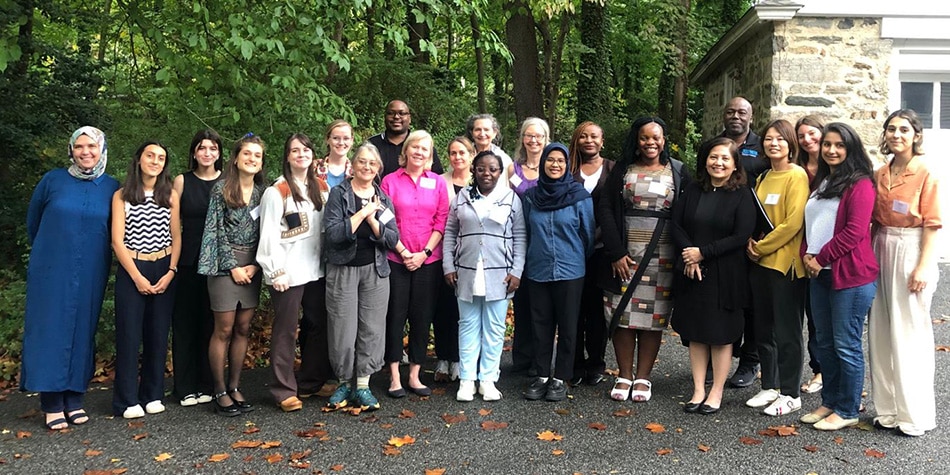
Article(s)
Collective reflection to support women and LGBTQIA+ people facing the death penalty
By World Coalition Against the Death Penalty, on 2 December 2024
The Gender and the Death Penalty seminar organized by the World Coalition in Philadelphia in September 2024 enabled to explore new abolitionist strategies. The event brought together organizations from 11 countries for stimulating exchanges.
Gender
Warning: Undefined variable $tmp in /home/worldcoa/coalition2020/wp-content/themes/WCADP/template-parts/contents.php on line 27
Women
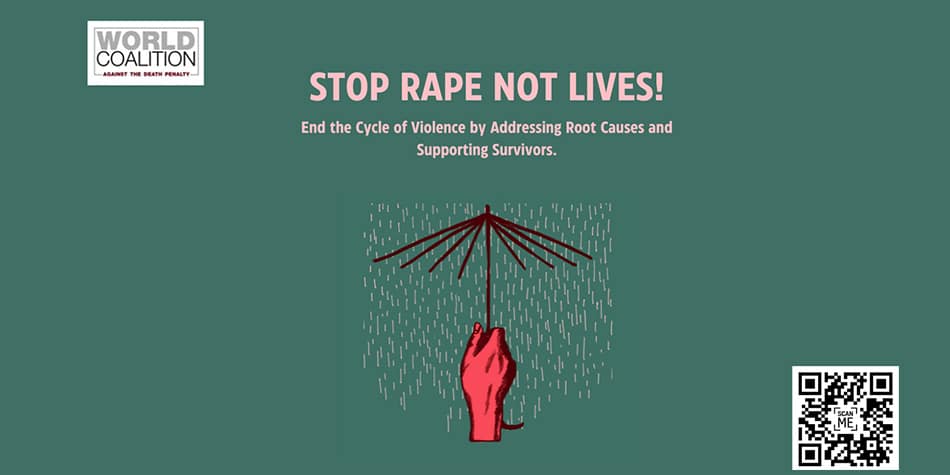
Article(s)
Why is the Death Penalty not the answer to Rape?
By Morine Chauvris, on 8 July 2024
Every October 10th, the World Coalition against the death penalty and its members celebrates the World Day against the Death penalty. In 2024 and 2025, the abolitionist movement will focus on challenging the widespread misconception that the death penalty enhances safety for individuals and communities.
2024
Warning: Undefined variable $tmp in /home/worldcoa/coalition2020/wp-content/themes/WCADP/template-parts/contents.php on line 27
Women
Document(s)
Gender Matters: Women on Death Row in the United States
By Sandra Babcock, Nathalie Greenfield, Kathryn Adamson, Cardozo Law Review , on 24 April 2024
2024
Academic report
Warning: Undefined variable $liste_type_doc in /home/worldcoa/coalition2020/wp-content/themes/WCADP/template-parts/contents-document.php on line 21
Warning: Undefined variable $liste_themes in /home/worldcoa/coalition2020/wp-content/themes/WCADP/template-parts/contents-document.php on line 35
Gender
Warning: Undefined variable $liste_pays in /home/worldcoa/coalition2020/wp-content/themes/WCADP/template-parts/contents-document.php on line 40
United States
Women
Warning: Undefined variable $tag_langue in /home/worldcoa/coalition2020/wp-content/themes/WCADP/template-parts/contents-document.php on line 85
More details See the document
This article presents a comprehensive study of 48 persons sentenced to death between 1990 and 2023 who presented as women at the time of their trials. This research is the first of its kind to conduct a holistic and intersectional analysis of the factors driving women’s death sentences. It reveals commonalities across women’s cases, delving into their experiences of motherhood, gender-based violence and prior involvement with the criminal legal system. This report also explore the nature of the women’s crimes of conviction, including the role of male co-defendants and the State’s use of aggravating factors. Finally, it reveals for the first time the extent to which capital prosecutions are dominated by men—including judges, elected District Attorneys, defense attorneys, and juror forepersons—and explain why gender matters in determining who lives and who dies
- Document type Academic report
- Countries list United States
- Themes list Gender / Women
Warning: Undefined variable $lien_langue in /home/worldcoa/coalition2020/wp-content/themes/WCADP/template-parts/contents-document.php on line 127
Document(s)
Does care have to be at the periphery if crime is at the centre? A conversation that unspools the various threads tying feminism with crime.
By The Third Eye, on 15 February 2024
2024
Article
Warning: Undefined variable $liste_type_doc in /home/worldcoa/coalition2020/wp-content/themes/WCADP/template-parts/contents-document.php on line 21
Warning: Undefined variable $liste_themes in /home/worldcoa/coalition2020/wp-content/themes/WCADP/template-parts/contents-document.php on line 35
Gender
Women
Warning: Undefined variable $tag_langue in /home/worldcoa/coalition2020/wp-content/themes/WCADP/template-parts/contents-document.php on line 85
More details See the document
Published on January 30, 2024.
The Third Eye invited Maitreyi Misra of Project 39A to help us think through our central idea: why do we need a feminist way of looking at crime, and how does that help the larger goal of social justice?
Project 39A is inspired by Article 39-A of the Indian Constitution, a provision that furthers the intertwined values of equal justice and equal opportunity by removing economic and social barriers. Using empirical research to re-examine practices and policies in the criminal justice system, Project 39A aims to trigger new conversations on legal aid, torture, forensics, mental health in prisons, and the death penalty.
- Document type Article
Warning: Undefined variable $liste_pays in /home/worldcoa/coalition2020/wp-content/themes/WCADP/template-parts/contents-document.php on line 107
- Themes list Gender / Women
Warning: Undefined variable $lien_langue in /home/worldcoa/coalition2020/wp-content/themes/WCADP/template-parts/contents-document.php on line 127
Document(s)
Women and The Death Penalty in Kenya: Essays on the Gendered Perspective of the Death Penalty
on 2 February 2024
2024
NGO report
Warning: Undefined variable $liste_type_doc in /home/worldcoa/coalition2020/wp-content/themes/WCADP/template-parts/contents-document.php on line 21
Warning: Undefined variable $liste_themes in /home/worldcoa/coalition2020/wp-content/themes/WCADP/template-parts/contents-document.php on line 35
Death Row Conditions
Fair Trial
Gender
Warning: Undefined variable $liste_pays in /home/worldcoa/coalition2020/wp-content/themes/WCADP/template-parts/contents-document.php on line 40
Kenya
Women
Warning: Undefined variable $tag_langue in /home/worldcoa/coalition2020/wp-content/themes/WCADP/template-parts/contents-document.php on line 85
More details See the document
This publication seeks to make visible the gender and intersectional discrimination faced by women in the judicial process leading to the death penalty. Through the various articlesin this publication, the authors bring to light the reality of women facing the death penalty through a different lens.
The first author, Shekinah Bright Kiting’a, in making a compelling case for abolition of the death penalty, explores how the death penalty uniquely affects women in the context of motherhood. Further, she highlights the rights and well-being of the children affected by their mothers’ death sentences, revealing flaws in our legal and ethical systems. With the overall aim of advocating for its abolition due to its significant impact on both parenthood and children’s rights, her article seeks to push for reforms that honour motherhood and prioritize children’s well-being in these difficult circumstances.
Kenaya Komba dissects gender disparity in the judicial system by exploring the intersection of domestic violence and the death penalty. In making a case for a restorative approach to justice, her article analyses the impact of capital punishment on victims of domestic violence and the systemic injustice and biases they continue to grapple with. Her elaborate analysis of the Constitution of Kenya, 2010 and the Protection Against Domestic Violence Act, 2016, highlights the urgent need for reform in the legal system.
While Analyzing the role the media plays in shaping perceptions of women on death row, Patricia Chepkirui evaluates the implications of positive and negative media portrayals of such women by highlighting the ethical responsibilities of media in the coverage of women on death row cases. The article ultimately underscores the significance of responsiblemedia coverage in ensuring that media exposure of cases of women on death row is fair,balanced, and respectful of their rights and dignity.
Alex Tamei delves into the intricacies of abuse, gender-based violence, and trauma as mitigating factors in death penalty sentencing for women. His article comparatively analyses two Kenyan cases of murder in retaliation to intimate partner violence, seeking to shed light on the plight of victims of gender-based violence. The article effortlessly brings out the nexus between the death penalty and intimate partner violence and makessolid recommendations for change.
The fifth author, Patience Chepchirchir, delves into the nexus between psychological abuse and provocation. Through her article, she brings out the scope of psychological abuse while focusing on the linkage between emotional abuse and provocation and how the same can be considered as mitigating factors. Through an elaborate analysis of case law, she makes a case for psychological abuse of women as a mitigating circumstance during sentencing.
Stella Cherono’s article reflects on the intersectional discrimination faced by women in the criminal trial process leading to death row. The article highlights the complex and overlapping forms of discrimination women experience during the pretrial, trial and sentencing stages. Through her comprehensive analysis of gendered pathways to offending and imprisonment, she challenges how society perceives discrimination.
Loraine Koskei Interrogates the emerging jurisprudence on Intimate Partner Violence.Her article lays out the gendered factor in the commissioning and sentencing of women convicted of murder and offers possible recommendations.
- Document type NGO report
- Countries list Kenya
- Themes list Death Row Conditions / Fair Trial / Gender / Women
Warning: Undefined variable $lien_langue in /home/worldcoa/coalition2020/wp-content/themes/WCADP/template-parts/contents-document.php on line 127
Document(s)
Gender, Violence, and the Death Penalty
By Sandra Babcock and Nathalie Greenfield, California Western International Law Journal , on 1 February 2024
2024
Academic Article
Warning: Undefined variable $liste_type_doc in /home/worldcoa/coalition2020/wp-content/themes/WCADP/template-parts/contents-document.php on line 21
Warning: Undefined variable $liste_themes in /home/worldcoa/coalition2020/wp-content/themes/WCADP/template-parts/contents-document.php on line 35
Gender
Women
Warning: Undefined variable $tag_langue in /home/worldcoa/coalition2020/wp-content/themes/WCADP/template-parts/contents-document.php on line 85
More details See the document
Published in 2023.
This article is the first in a series that will systematically explore how gender has affected the criminal proceedings of women currently on death row. For this inaugural article, we have undertaken the first—and, to our knowledge, only comprehensive analysis of gender-based violence (“GBV”) in the lives of all women currently on death row, examining the prevalence of GBV and how it has shaped the lives and affected the criminal prosecutions of women facing execution. Our research reveals, for the first time, that almost every woman on death row in the United States has experienced GBV. Indeed,the great majority have experienced more than one incident of GBV in their lifetime. Our findings align with previous studies demonstrating that women’s pathways to incarceration are paved with physical, sexual, and psychological abuse. Our research further shows that both in the United States and around the world, defense attorneys frequently fail to present evidence of GBV in women’s capital trials. When they do introduce such evidence, they fail to fully explain the nature of their clients’ victimization and the harm they have suffered as a result. Moreover, prosecutors frequently rely on gendered tropes to discredit women’s accounts of violence such as childhood sexual abuse, rape, and intimate partner violence. Consequently, those who sentence women to die rarely comprehend the extensive trauma that the women have endured throughout their lives, and how that trauma relates to their legal and moral culpability.
- Document type Academic Article
Warning: Undefined variable $liste_pays in /home/worldcoa/coalition2020/wp-content/themes/WCADP/template-parts/contents-document.php on line 107
- Themes list Gender / Women
Warning: Undefined variable $lien_langue in /home/worldcoa/coalition2020/wp-content/themes/WCADP/template-parts/contents-document.php on line 127
Document(s)
Documentaire: femmes dans la couloir de la mort
By Investigations et Enquêtes , on 17 January 2024
2024
Multimedia content
Warning: Undefined variable $liste_type_doc in /home/worldcoa/coalition2020/wp-content/themes/WCADP/template-parts/contents-document.php on line 21
Warning: Undefined variable $liste_themes in /home/worldcoa/coalition2020/wp-content/themes/WCADP/template-parts/contents-document.php on line 35
Death Row Conditions
Gender
Warning: Undefined variable $liste_pays in /home/worldcoa/coalition2020/wp-content/themes/WCADP/template-parts/contents-document.php on line 40
United States
Women
Warning: Undefined variable $tag_langue in /home/worldcoa/coalition2020/wp-content/themes/WCADP/template-parts/contents-document.php on line 85
More details See the document
Un regard déchirant sur la vie des femmes condamnées et les failles du système judiciaire américain. Aux Etats-Unis, 54 femmes « attendent » l’exécution de leur peine. Linda Carty et Melissa Lucio sont emprisonnées au Texas, Shawna Forde en Arizona. Elles se livrent. Parmi les prisonnières, certaines espèrent la révision de leur procès.
- Document type Multimedia content
- Countries list United States
- Themes list Death Row Conditions / Gender / Women
Warning: Undefined variable $lien_langue in /home/worldcoa/coalition2020/wp-content/themes/WCADP/template-parts/contents-document.php on line 127
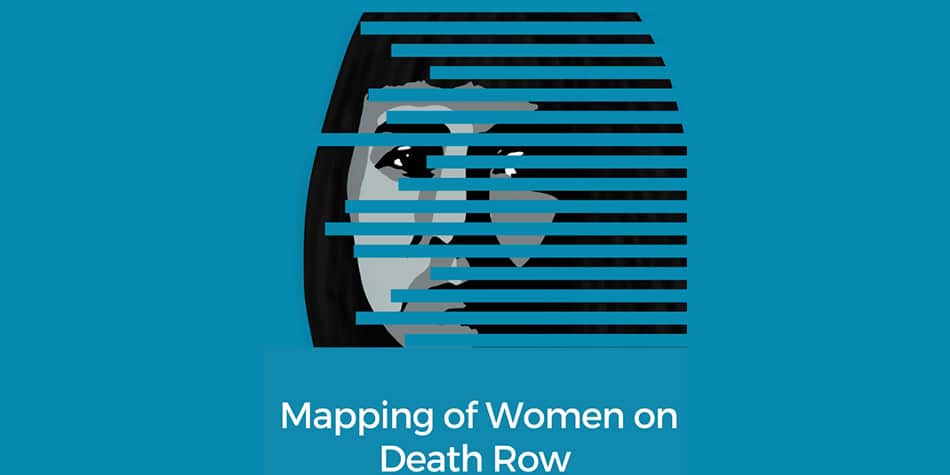
Article(s)
La Coalition mondiale publie un rapport cartographique sur les femmes dans le couloir de la mort
By Coalition mondiale contre la peine de mort, on 8 September 2023
Afin d’obtenir une vision globale des données existantes sur les femmes condamnées à mort, la Coalition mondiale a réalisé un exercice de systématisation de ces données, compilé dans un rapport publié en août 2023.
2023
Warning: Undefined variable $tmp in /home/worldcoa/coalition2020/wp-content/themes/WCADP/template-parts/contents.php on line 27
Women

Article(s)
World Coalition Publishes Country Mapping Report on Women on Death Row
By World coalition against the death penalty, on 8 September 2023
To obtain a global view of existing data on women sentenced to death, the World Coalition carried out a systematization exercise of new data, compiled in a report published in August 2023.
Warning: Undefined variable $tmp in /home/worldcoa/coalition2020/wp-content/themes/WCADP/template-parts/contents.php on line 27
Women
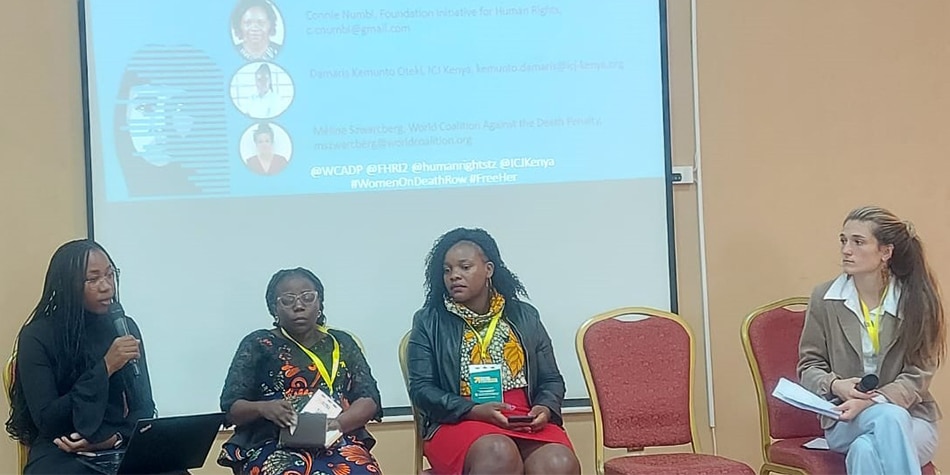
Article(s)
Plaidoyé pour la reconnaissance de la réalité des femmes condamnées à mort dans la lutte pour les droits des femmes
By Coalition mondiale contre la peine de mort, on 15 August 2023
Du 16 au 20 juillet, une délégation de la Coalition mondiale, composée de Connie Numbi de Foundation for Human Rights Initiative, Dr. Anna Henga de Legal Human Right Center, Damaris Kemunto de la Section kenyane de la Commission internationale des juristes (ICJ Kenya), et Méline Szwarcberg, responsable de projet femme et genre à la Coalition […]
2023
Gender
Women

Article(s)
Advocating for the recognition of women sentenced to death in the fight for women’s rights
By World coalition against the death penalty, on 15 August 2023
From July 16 to 20, a World Coalition delegation comprising Connie Numbi of Foundation for Human Rights Initiative Uganda, Dr Anna Henga of Legal Human Right Center Tanzania, Damaris Kemunto of the Kenyan Section of the International Commission of Jurists (ICJ Kenya), and Méline Szwarcberg, Women and Gender Project Manager at the World Coalition, attended […]
Gender
Warning: Undefined variable $tmp in /home/worldcoa/coalition2020/wp-content/themes/WCADP/template-parts/contents.php on line 27
Women
Document(s)
Silently Silenced: State-Sanctioned Killing of Women
By Eleos Justice, Cornell Center on the Death Penalty Worldwide , on 30 March 2023
2023
Academic report
Warning: Undefined variable $liste_type_doc in /home/worldcoa/coalition2020/wp-content/themes/WCADP/template-parts/contents-document.php on line 21
Warning: Undefined variable $liste_themes in /home/worldcoa/coalition2020/wp-content/themes/WCADP/template-parts/contents-document.php on line 35
Women
Warning: Undefined variable $tag_langue in /home/worldcoa/coalition2020/wp-content/themes/WCADP/template-parts/contents-document.php on line 85
More details See the document
Silently Silenced: State-Sanctioned Killing of Women examines States’ involvement in ‘feminicide’. Feminicide is understood as the gender-motivated killing of women and girls that States actively engage in, condone, excuse, or fail to prevent. We use the term ‘feminicide’ to refer to the various forms of State-sanctioned killing of women and girls. In this report, we outline States’ direct involvement and complicity in the killings of women and girls and explain these deaths as a product of gendered forms of structural violence upheld and sustained by the State. We examine 3 types of feminicide: gender- related killings of women directly perpetrated by the State, such as the death penalty and extrajudicial killings; gender-related killings of women committed by non-State actors that are excused or condoned by the State; and gender-related killings of women that the State failed to prevent.
- Document type Academic report
Warning: Undefined variable $liste_pays in /home/worldcoa/coalition2020/wp-content/themes/WCADP/template-parts/contents-document.php on line 107
- Themes list Women
Warning: Undefined variable $lien_langue in /home/worldcoa/coalition2020/wp-content/themes/WCADP/template-parts/contents-document.php on line 127
Document(s)
Seven Winters in Teheran
By Steffi Niederzoll, on 24 March 2023
2023
Multimedia content
Warning: Undefined variable $liste_type_doc in /home/worldcoa/coalition2020/wp-content/themes/WCADP/template-parts/contents-document.php on line 21
Warning: Undefined variable $liste_themes in /home/worldcoa/coalition2020/wp-content/themes/WCADP/template-parts/contents-document.php on line 35
Gender
Warning: Undefined variable $liste_pays in /home/worldcoa/coalition2020/wp-content/themes/WCADP/template-parts/contents-document.php on line 40
Iran (Islamic Republic of)
Women
Warning: Undefined variable $tag_langue in /home/worldcoa/coalition2020/wp-content/themes/WCADP/template-parts/contents-document.php on line 54
Warning: Undefined variable $lien_langue in /home/worldcoa/coalition2020/wp-content/themes/WCADP/template-parts/contents-document.php on line 55
fr
More details See the document
In the summer of 2007, an older man approaches Reyhaneh Jabbari and asks the architecture student who has a side job as an interior decorator for her help in the design of offices. During the site inspection, he tries to rape her. Reyhaneh stabs him in self-defence. She is arrested for murder and sentenced to death. Reyhaneh was to spend the next seven years in prison while her family hired lawyers and made the public aware of the case. However, in spite of the efforts of national and international politicians and human rights organisations, the Iranian judiciary continued to cite the “right of blood-revenge”. This meant that, as long as Reyhaneh did not withdraw her accusations against the man, his family could demand her death. Reyhaneh stuck to her testimony and was hanged at the age of 26.
In her moving and shockingly topical documentary debut, director Steffi Niederzoll uses among other things original audio and visual material that was smuggled out of Iran. This film, in which Holy Spider actor Zar Amir Ebrahimi lends Reyhaneh her voice, makes visible the injustice in Iranian society and portrays an involuntary heroine who gave her life in the fight for women’s rights.
- Document type Multimedia content
- Countries list Iran (Islamic Republic of)
- Themes list Gender / Women
- Available languages Sept hivers à Téhéran

Article(s)
Reflecting on the links between the death penalty and gender-based violence
By World Coalition Against the Death Penalty, on 25 November 2022
On 25 November 2022, International Day for the Elimination of Violence against Women, the World Coalition Against the Death Penalty, through the testimony of representatives of abolitionist member and partner organizations, wishes to raise awareness of the links between the death penalty and violence against women and gender minorities and call out the unjust and […]
2022
Gender
Warning: Undefined variable $tmp in /home/worldcoa/coalition2020/wp-content/themes/WCADP/template-parts/contents.php on line 27
Kenya
Sri Lanka
Uganda
Women

Article(s)
Réflexion sur les liens entre peine de mort et violences fondées sur le genre
By Coalition mondiale contre la peine de mort, on 25 November 2022
En ce 25 novembre 2022, Journée internationale pour l’élimination de la violence à l’égard des femmes, la Coalition mondiale contre la peine de mort, à travers le témoignage de représentant·es d’organisations abolitionnistes membres et partenaires, souhaite visibiliser les liens entre peine de mort et violences faites aux femmes et aux minorités de genre et dénoncer […]
Gender
Warning: Undefined variable $tmp in /home/worldcoa/coalition2020/wp-content/themes/WCADP/template-parts/contents.php on line 27
Kenya
Sri Lanka
Uganda
Women
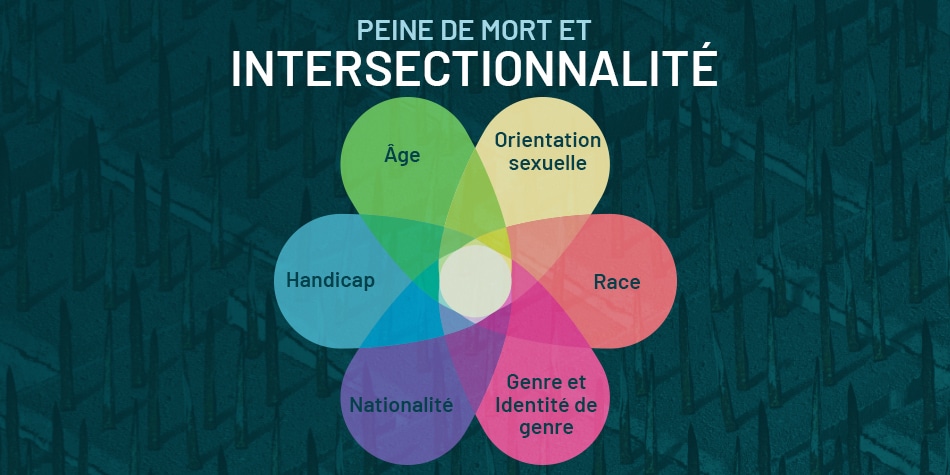
Article(s)
Déclaration commune sur la peine de mort et les droits des femmes et des personnes LGBTQIA+
By Coalition mondiale contre la peine de mort, on 10 October 2022
20 ème Journée Mondiale contre la Peine de Mort Pour ce 20-ème anniversaire de la Journée Mondiale contre la Peine de Mort dédiée à la réflexion sur le lien entre la torture et le recours à la peine de mort et en continuation de la Journée Mondiale contre la peine de mort de 2021 sur […]
2022
Cruel, Inhuman and Degrading Treatment and Punishment
Death Row Conditions
Fair Trial
Warning: Undefined variable $tmp in /home/worldcoa/coalition2020/wp-content/themes/WCADP/template-parts/contents.php on line 27
Women
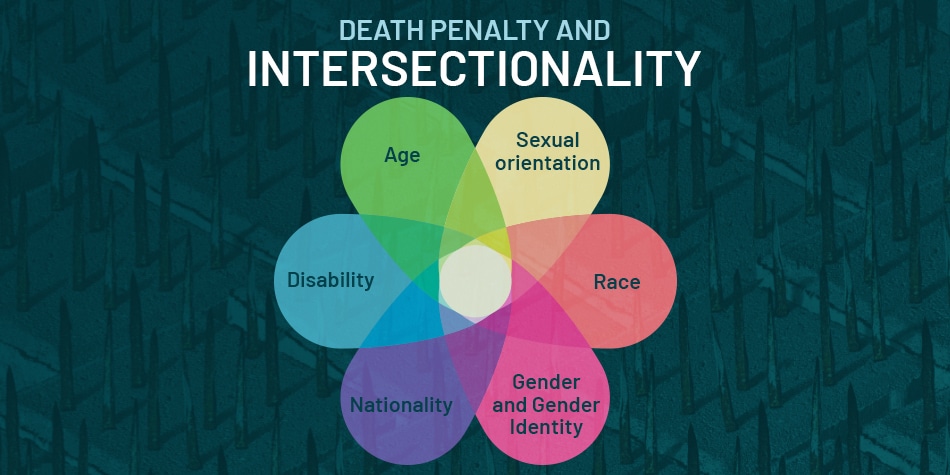
Article(s)
Joint statement on the death penalty and human rights of women and LGBTQIA+ individuals
By World Coalition Against the Death Penalty, on 10 October 2022
20th World Day against the Death Penalty On this 20th anniversary of the World Day Against the Death Penalty dedicated to the link between torture and the use of the death penalty and in continuation of the 2021 World Day Against the Death Penalty dedicated to women facing capital punishment, sentenced to death, executed, pardoned […]
Cruel, Inhuman and Degrading Treatment and Punishment
Death Row Conditions
Fair Trial
Warning: Undefined variable $tmp in /home/worldcoa/coalition2020/wp-content/themes/WCADP/template-parts/contents.php on line 27
Women
Document(s)
Philippines – Committee on the Elimination of Discrimination Against Women – Death Penalty – June 2022
on 21 July 2022
2022
NGO report
Warning: Undefined variable $liste_type_doc in /home/worldcoa/coalition2020/wp-content/themes/WCADP/template-parts/contents-document.php on line 21
Warning: Undefined variable $liste_pays in /home/worldcoa/coalition2020/wp-content/themes/WCADP/template-parts/contents-document.php on line 40
Philippines
Warning: Undefined variable $liste_themes in /home/worldcoa/coalition2020/wp-content/themes/WCADP/template-parts/contents-document.php on line 35
Women
Warning: Undefined variable $tag_langue in /home/worldcoa/coalition2020/wp-content/themes/WCADP/template-parts/contents-document.php on line 85
More details Download [ pdf - 443 Ko ]
The Government of the Philippines has taken commendable steps toward protecting and promoting the rights of women overseas Filipino workers (OFWs), but those workers remain vulnerable to exploitation and abuse, and when they come into conflict with the law in their host countries, their vulnerabilities are compounded by linguistic and legal barriers, as well as judicial systems which fail to account for the gendered context in which they allegedly committed criminal acts. The Government of the Philippines should do more to ensure protection of the rights of these women OFWs, particularly when they are at risk of being sentenced to death.
- Document type NGO report
- Countries list Philippines
- Themes list Women
Warning: Undefined variable $lien_langue in /home/worldcoa/coalition2020/wp-content/themes/WCADP/template-parts/contents-document.php on line 127
Document(s)
2021 World Day Report
on 10 June 2022
2022
World Coalition
Warning: Undefined variable $liste_type_doc in /home/worldcoa/coalition2020/wp-content/themes/WCADP/template-parts/contents-document.php on line 21
Warning: Undefined variable $liste_themes in /home/worldcoa/coalition2020/wp-content/themes/WCADP/template-parts/contents-document.php on line 35
Women
Warning: Undefined variable $tag_langue in /home/worldcoa/coalition2020/wp-content/themes/WCADP/template-parts/contents-document.php on line 54
Warning: Undefined variable $lien_langue in /home/worldcoa/coalition2020/wp-content/themes/WCADP/template-parts/contents-document.php on line 55
fr
More details Download [ pdf - 4154 Ko ]
On 10 October 2021, the World Coalition and abolitionists around the world celebrated the 19th World Day Against the Death Penalty (‘World Day’). Every year on World Day, the World Coalition highlights one problematic aspect of the Death Penalty. In 2021, the World Day explored the theme “Women sentenced to death, an invisible reality” to raise awareness on how the treatment of gender and gender-based inequalities create particularly precarious conditions for women sentenced to capital punishment. This report presents the activities organised for the 19th World Day and the media coverage it received.
- Document type World Coalition
Warning: Undefined variable $liste_pays in /home/worldcoa/coalition2020/wp-content/themes/WCADP/template-parts/contents-document.php on line 107
- Themes list Women
- Available languages Rapport journée mondiale 2021
Document(s)
Malawi – Committee on the Elimination of Discrimination Against Women – Death Penalty – January 2022
on 31 January 2022
2022
NGO report
Warning: Undefined variable $liste_type_doc in /home/worldcoa/coalition2020/wp-content/themes/WCADP/template-parts/contents-document.php on line 21
World Coalition
Warning: Undefined variable $liste_pays in /home/worldcoa/coalition2020/wp-content/themes/WCADP/template-parts/contents-document.php on line 40
Malawi
Warning: Undefined variable $liste_themes in /home/worldcoa/coalition2020/wp-content/themes/WCADP/template-parts/contents-document.php on line 35
Women
Warning: Undefined variable $tag_langue in /home/worldcoa/coalition2020/wp-content/themes/WCADP/template-parts/contents-document.php on line 85
More details Download [ pdf - 311 Ko ]
Detention conditions for women in Malawi are crowded, and women in prisons are not given adequate food and nutrition. Specifically, many prisons only serve people with one meal a day, often consisting of a maize meal (nsima) and peas or beans. Overcrowded conditions are a particular concern during the COVID-19 pandemic, when risk of transmission of the disease is high. Prison conditions in Malawi amount to inhuman and degrading treatment.
Women in death penalty proceedings in Malawi lack access to qualified legal representation. Defense advocates in Malawi who are assigned to capital cases often lack relevant experience. In at least one case, a lawyer failed to raise the complete defense of self-defense in representing a woman who killed her husband as a result of a long history of domestic abuse. Had the defense been raised, it is possible that the woman would not have been sentenced to death. Moreover, women from poor and marginalized communities are disproportionately affected by the death penalty because when they are accused of crimes, they are often unable to understand the charges against them because they are illiterate and cannot read the complaint against them. They are also unable to retain private counsel.
Women who face extensive gender-based violence are disproportionately affected by the death penalty in Malawi, including those who seek to protect themselves against their abusers. Long histories of gender-based violence can result in complex trauma and can exacerbate psycho-social or intellectual disabilities, yet sentencing courts fail to take these nefarious effects into account as factors in mitigation of a death sentence.
- Document type NGO report / World Coalition
- Countries list Malawi
- Themes list Women
Warning: Undefined variable $lien_langue in /home/worldcoa/coalition2020/wp-content/themes/WCADP/template-parts/contents-document.php on line 127
Document(s)
In the Extreme: Women Serving Life Without Parole and Death Sentences in the United States
By The Sentencing Project, National Black Women’s Justice Institute and the Cornell Center on the Death Penalty Worldwide, on 14 January 2022
2022
NGO report
Warning: Undefined variable $liste_type_doc in /home/worldcoa/coalition2020/wp-content/themes/WCADP/template-parts/contents-document.php on line 21
Warning: Undefined variable $liste_themes in /home/worldcoa/coalition2020/wp-content/themes/WCADP/template-parts/contents-document.php on line 35
Women
Warning: Undefined variable $tag_langue in /home/worldcoa/coalition2020/wp-content/themes/WCADP/template-parts/contents-document.php on line 85
More details See the document
One of every 15 women in prison — amounting to more than 6,600 women — is serving a life sentence and nearly 2,000 of these have no chance for parole. Another 52 women in the U.S. are awaiting execution. Many women serving extreme sentences were victims of physical, sexual, and emotional abuse long before they committed a crime.
- Document type NGO report
Warning: Undefined variable $liste_pays in /home/worldcoa/coalition2020/wp-content/themes/WCADP/template-parts/contents-document.php on line 107
- Themes list Women
Warning: Undefined variable $lien_langue in /home/worldcoa/coalition2020/wp-content/themes/WCADP/template-parts/contents-document.php on line 127
Document(s)
Defending Women and Transgender Persons Facing Extreme Sentences: A Practical Guide
on 14 January 2022
Legal Representation
Warning: Undefined variable $liste_type_doc in /home/worldcoa/coalition2020/wp-content/themes/WCADP/template-parts/contents-document.php on line 21
Warning: Undefined variable $liste_themes in /home/worldcoa/coalition2020/wp-content/themes/WCADP/template-parts/contents-document.php on line 35
Legal Representation
Women
Warning: Undefined variable $tag_langue in /home/worldcoa/coalition2020/wp-content/themes/WCADP/template-parts/contents-document.php on line 54
Warning: Undefined variable $lien_langue in /home/worldcoa/coalition2020/wp-content/themes/WCADP/template-parts/contents-document.php on line 55
fr
More details See the document
Written by a team including experts in the fields of capital defense, gender rights, gender-sensitive mitigation and the rights of transgender persons, the guide includes sections on gender-based violence, women’s mental health, prison conditions, discrimination in the legal system, working with the media, and how to build a gender-sensitive team. It also includes a step-by-step gender-sensitive interview protocol that builds on resources developed by the anti-violence community and is tailored to the needs of defense teams.
- Document type Legal Representation
Warning: Undefined variable $liste_pays in /home/worldcoa/coalition2020/wp-content/themes/WCADP/template-parts/contents-document.php on line 107
- Themes list Legal Representation / Women
- Available languages Défendre les femmes et les personnes transgenres confrontées à des peines extrêmes
Document(s)
Uganda – Committee on the Elimination of Discrimination Against Women – Death Penalty – January 2022
on 12 January 2022
2022
NGO report
Warning: Undefined variable $liste_type_doc in /home/worldcoa/coalition2020/wp-content/themes/WCADP/template-parts/contents-document.php on line 21
World Coalition
Warning: Undefined variable $liste_pays in /home/worldcoa/coalition2020/wp-content/themes/WCADP/template-parts/contents-document.php on line 40
Uganda
Warning: Undefined variable $liste_themes in /home/worldcoa/coalition2020/wp-content/themes/WCADP/template-parts/contents-document.php on line 35
Women
Warning: Undefined variable $tag_langue in /home/worldcoa/coalition2020/wp-content/themes/WCADP/template-parts/contents-document.php on line 85
More details Download [ pdf - 243 Ko ]
This report addresses Uganda’s compliance with its obligations under the Convention on the Elimination of All Forms of Discrimination Against Women with respect to the death penalty. The report examines and discusses Ugandan death penalty laws and cases where women are sentenced to death row in Uganda, primarily for murder.
This report recommends that Uganda adopt a number of key recommendations to better align its death penalty practices with Uganda’s obligations to women under the Convention. These steps, among other things, include: (1) abolishing the death penalty and in the interim, limiting the death penalty to only the most serious crimes of intentional killing of another human; (2) ensuring proper gender-sensitive training in the judicial system and protecting women in conflict with the law when gender-based violence is involved; (3) developing and implementing programs to prevent gender-based violence and discrimination; and (4) ensuring fair access to counsel to women sentenced to death or at risk of being sentenced to death.
- Document type NGO report / World Coalition
- Countries list Uganda
- Themes list Women
Warning: Undefined variable $lien_langue in /home/worldcoa/coalition2020/wp-content/themes/WCADP/template-parts/contents-document.php on line 127
Document(s)
Lebanon – Committee on the Elimination of Discrimination Against Women – Death Penalty
on 12 January 2022
NGO report
Warning: Undefined variable $liste_type_doc in /home/worldcoa/coalition2020/wp-content/themes/WCADP/template-parts/contents-document.php on line 21
World Coalition
Warning: Undefined variable $liste_pays in /home/worldcoa/coalition2020/wp-content/themes/WCADP/template-parts/contents-document.php on line 40
Lebanon
Warning: Undefined variable $liste_themes in /home/worldcoa/coalition2020/wp-content/themes/WCADP/template-parts/contents-document.php on line 35
Women
Warning: Undefined variable $tag_langue in /home/worldcoa/coalition2020/wp-content/themes/WCADP/template-parts/contents-document.php on line 85
More details Download [ pdf - 1599 Ko ]
This report addresses Lebanon’s compliance with human rights obligations under the Convention on the Elimination of All Forms of Discrimination Against Women regarding its use of the death penalty.
Lebanon has not abolished the death penalty or established a de jure moratorium on the death penalty. The legal system does not protect women in conflict with the law from discrimination on the basis of sex or gender. Nor does it limit capital offenses to the “most serious” crimes.
Women migrant domestic workers appear to be at an elevated risk of being sentenced to death. Indeed, all three women known to be on death row in Lebanon are Sri Lankan migrant domestic workers. Such women face heightened obstacles to realizing their right to a fair trial. Moreover, there is no evidence that sentencing authorities take into account a woman’s history of abuse when determining an appropriate sentence. Finally, women under sentence of death face degrading conditions of detention.
- Document type NGO report / World Coalition
- Countries list Lebanon
- Themes list Women
Warning: Undefined variable $lien_langue in /home/worldcoa/coalition2020/wp-content/themes/WCADP/template-parts/contents-document.php on line 127
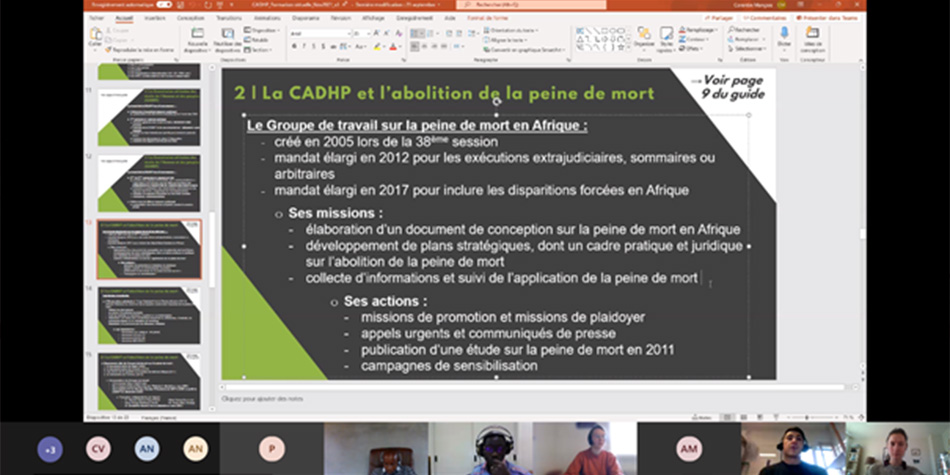
Article(s)
NGO Forum and 69th Ordinary Session of the African Commission of Human and Peoples’ Rights
By Bronwyn Dudley and Corentin Mançois, on 17 December 2021
The ACHPR (the African Commission on Human and Peoples’ Rights) met again virtually for its 69th Ordinary Session from 15 November – 5 December 2021.
2021
Warning: Undefined variable $tmp in /home/worldcoa/coalition2020/wp-content/themes/WCADP/template-parts/contents.php on line 27
Terrorism
Women
Document(s)
Advisory on the Increased Vulnerabilty of Women Migrant Workers on Death Row
By Commission on Human Rights of the Philippines, on 3 December 2021
2021
Government body report
Warning: Undefined variable $liste_type_doc in /home/worldcoa/coalition2020/wp-content/themes/WCADP/template-parts/contents-document.php on line 21
Warning: Undefined variable $liste_themes in /home/worldcoa/coalition2020/wp-content/themes/WCADP/template-parts/contents-document.php on line 35
Drug Offenses
Legal Representation
Warning: Undefined variable $liste_pays in /home/worldcoa/coalition2020/wp-content/themes/WCADP/template-parts/contents-document.php on line 40
Philippines
Women
Warning: Undefined variable $tag_langue in /home/worldcoa/coalition2020/wp-content/themes/WCADP/template-parts/contents-document.php on line 54
Warning: Undefined variable $lien_langue in /home/worldcoa/coalition2020/wp-content/themes/WCADP/template-parts/contents-document.php on line 55
fr
More details Download [ pdf - 1457 Ko ]
The Commission on Human Rights of the Philippines issues this advisory to bring the Philippines’ attention to the heightened vulnerabilities of women Overseas Filipino Workers (OFWs).
- Document type Government body report
- Countries list Philippines
- Themes list Drug Offenses / Legal Representation / Women
- Available languages Avis sur la vulnérabilité accrue des travailleuses migrantes dans le couloir de la mort
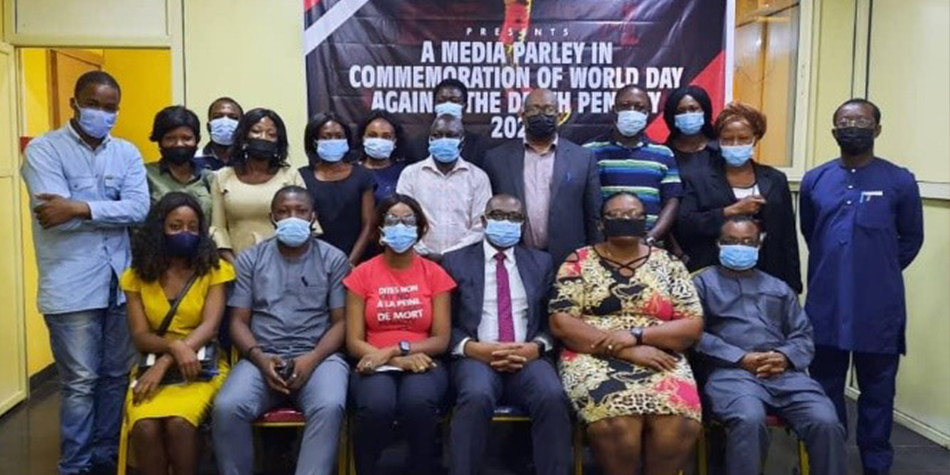
Article(s)
Women Sentenced to Death Showcased on the 19th World Day Against the Death Penalty
By Elise Garel, on 3 December 2021
With the theme “Women sentenced death: an invisible reality”, the 19th World Day Against the Death Penalty aimed to highlight the issues faced by women who are sentenced to death, executed, pardoned or exonerated around the world.
Cameroon
Warning: Undefined variable $tmp in /home/worldcoa/coalition2020/wp-content/themes/WCADP/template-parts/contents.php on line 27
Indonesia
Iran (Islamic Republic of)
Morocco
Nigeria
Pakistan
Sierra Leone
United States
Women
Document(s)
Worked to Death: A study on migrant workers and capital punishment
By Migrant Care and Reprieve, on 24 November 2021
2021
NGO report
Warning: Undefined variable $liste_type_doc in /home/worldcoa/coalition2020/wp-content/themes/WCADP/template-parts/contents-document.php on line 21
Warning: Undefined variable $liste_themes in /home/worldcoa/coalition2020/wp-content/themes/WCADP/template-parts/contents-document.php on line 35
Fair Trial
Warning: Undefined variable $liste_pays in /home/worldcoa/coalition2020/wp-content/themes/WCADP/template-parts/contents-document.php on line 40
Indonesia
Legal Representation
Malaysia
Nigeria
Pakistan
Saudi Arabia
Women
Warning: Undefined variable $tag_langue in /home/worldcoa/coalition2020/wp-content/themes/WCADP/template-parts/contents-document.php on line 85
More details See the document
Foreign nationals, and within this group migrant workers, are a population that disproportionately faces the death penalty around the world. The data and statistics gathered by Reprieve and Migrant CARE for this report show that migrant workers as a sub-set of the foreign national population are at grave risk of human rights violations related to the death penalty, including arbitrary deprivation of the right to life in the context of unlawful death sentences and executions.
This report focuses on: states that receive migrant workers (‘receiving states’), in particular the states that make up the Association of South East Asian Nations or ASEAN (‘South East Asian states’) and the Gulf Cooperation Council (‘Gulf states’), and on states from which migrant workers travel to work (‘sending states’).
- Document type NGO report
- Countries list Indonesia / Malaysia / Nigeria / Pakistan / Saudi Arabia
- Themes list Fair Trial / Legal Representation / Women
Warning: Undefined variable $lien_langue in /home/worldcoa/coalition2020/wp-content/themes/WCADP/template-parts/contents-document.php on line 127
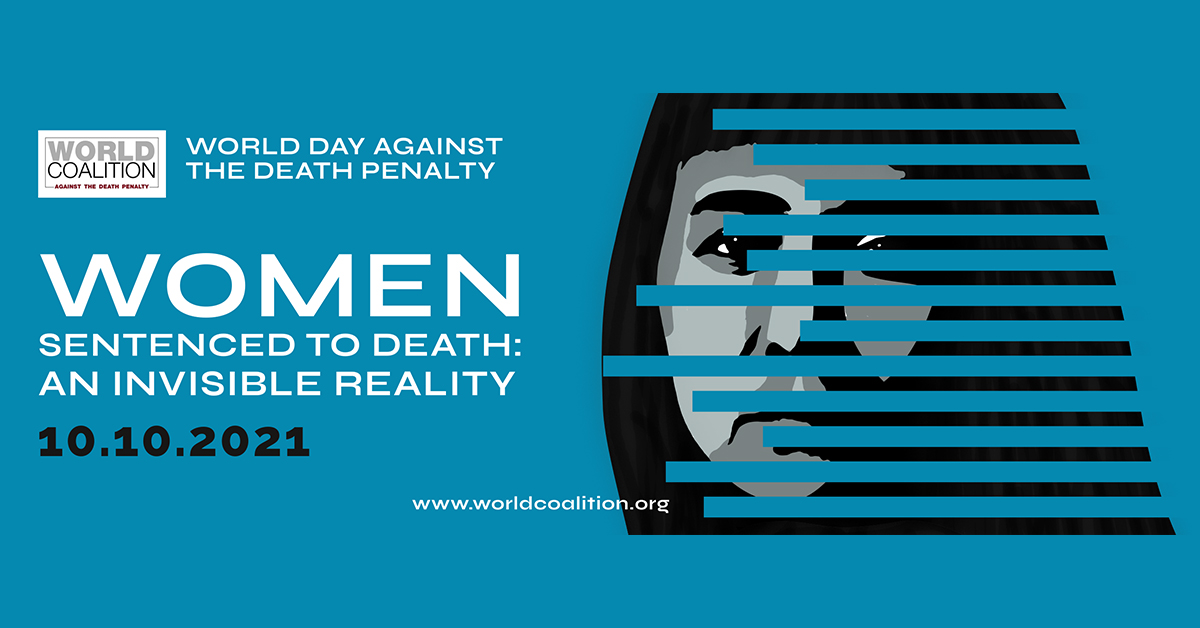
Article(s)
Joint Declaration on the Death Penalty and Women’s Rights
By World Coalition Against the Death Penalty, on 10 October 2021
As we mark the 19th World Day Against the Death Penalty dedicated to women facing capital punishment, who have been sentenced to death, who have been executed or who have been pardoned or found not guilty, the members of the World Coalition Against the Death Penalty and allies of women sentenced to death take this […]
2021
Warning: Undefined variable $tmp in /home/worldcoa/coalition2020/wp-content/themes/WCADP/template-parts/contents.php on line 27
Women
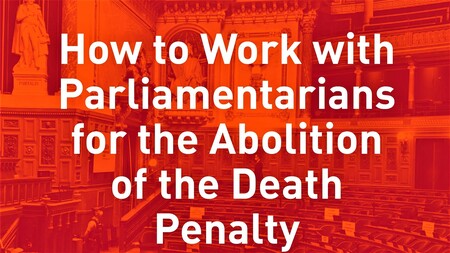
Article(s)
Publication of a New Guide on Working with Parliamentarians to Abolish the Death Penalty
By World Coalition Against the Death Penalty, on 10 October 2021
The World Coalition Against the Death Penalty, in partnership with Parliamentarians for Global Action (PGA), has published a new how-to guide for civil society organizations (CSOs) on how to collaborate with parliamentarians to abolish the death penalty.
Warning: Undefined variable $tmp in /home/worldcoa/coalition2020/wp-content/themes/WCADP/template-parts/contents.php on line 27
Women
Document(s)
Women and the Death Penalty in Iran
By Iran Human Rights, on 8 October 2021
2021
NGO report
Warning: Undefined variable $liste_type_doc in /home/worldcoa/coalition2020/wp-content/themes/WCADP/template-parts/contents-document.php on line 21
Warning: Undefined variable $liste_pays in /home/worldcoa/coalition2020/wp-content/themes/WCADP/template-parts/contents-document.php on line 40
Iran (Islamic Republic of)
Warning: Undefined variable $liste_themes in /home/worldcoa/coalition2020/wp-content/themes/WCADP/template-parts/contents-document.php on line 35
Women
Warning: Undefined variable $tag_langue in /home/worldcoa/coalition2020/wp-content/themes/WCADP/template-parts/contents-document.php on line 85
More details See the document
In observation of the 2021 World Day Against the Death Penalty dedicated to women, Iran Human Rights is providing a report on the women executed in Iran over the last 12 years (2010-2021). The executions in this period are by no means representative of the Islamic Republic of Iran’s complete history of executing women; the number of female political prisoners executed in the 1980s must be acknowledged due to their sheer volume and abhorrent nature. But even today, there is ample evidence of their cruel and inhuman treatment of female prisoners, which will be highlighted in this report.
- Document type NGO report
- Countries list Iran (Islamic Republic of)
- Themes list Women
Warning: Undefined variable $lien_langue in /home/worldcoa/coalition2020/wp-content/themes/WCADP/template-parts/contents-document.php on line 127
Document(s)
“No One Believed Me”: A Global Overview of Women Facing the Death Penalty for Drug Offenses
on 5 October 2021
2021
NGO report
Warning: Undefined variable $liste_type_doc in /home/worldcoa/coalition2020/wp-content/themes/WCADP/template-parts/contents-document.php on line 21
Warning: Undefined variable $liste_themes in /home/worldcoa/coalition2020/wp-content/themes/WCADP/template-parts/contents-document.php on line 35
Drug Offenses
Women
Warning: Attempt to read property "post_name" on null in /home/worldcoa/coalition2020/wp-content/themes/WCADP/template-parts/contents-document.php on line 54
Warning: Undefined variable $tag_langue in /home/worldcoa/coalition2020/wp-content/themes/WCADP/template-parts/contents-document.php on line 54
Warning: Attempt to read property "post_name" on null in /home/worldcoa/coalition2020/wp-content/themes/WCADP/template-parts/contents-document.php on line 55
Warning: Attempt to read property "post_title" on null in /home/worldcoa/coalition2020/wp-content/themes/WCADP/template-parts/contents-document.php on line 55
Warning: Undefined variable $lien_langue in /home/worldcoa/coalition2020/wp-content/themes/WCADP/template-parts/contents-document.php on line 55
fr
More details See the document
“No one believed me” is a quote from Merri Utami, who was sentenced to death for drug trafficking in Indonesia in 2002. Her quote reflects the injustices faced by women accused of capital drug offenses around the world: many decision-makers disbelieve women’s plausible innocence claims or discount the effects of relationships and economic instability on women’s decisions to traffic drugs.
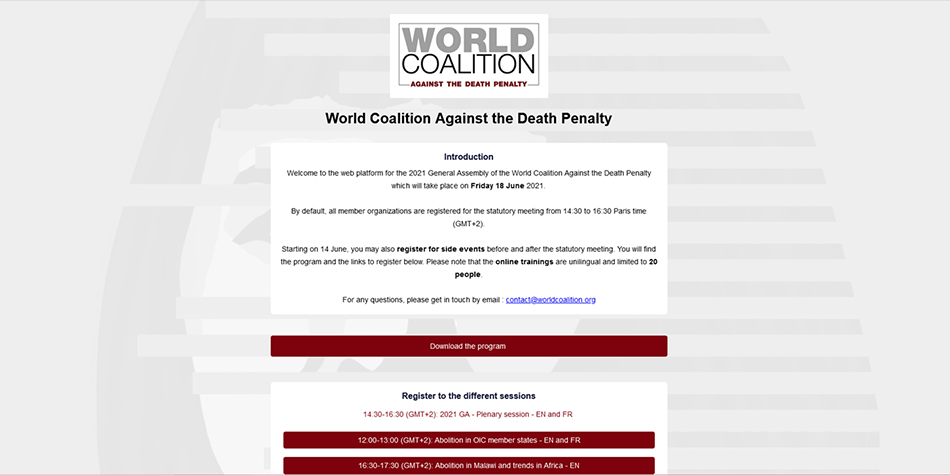
Article(s)
Recapping and video recordings of the side events of the 2021 General Assembly
By Elise Garel, World Coalition Against the Death Penalty, on 27 September 2021
On June 18, 2021, on the sidelines of the General Assembly of the World Coalition Against the Death Penalty, several events were organized. These events were an opportunity for the members of the World Coalition to address many issues related to the fight for the abolition of the death penalty.
2021
Warning: Undefined variable $tmp in /home/worldcoa/coalition2020/wp-content/themes/WCADP/template-parts/contents.php on line 27
Juveniles
Legal Representation
Women
Document(s)
Yemen – Committee on the Elimination of Discrimination Against Women – Death Penalty – September 2021
on 20 September 2021
2021
NGO report
Warning: Undefined variable $liste_type_doc in /home/worldcoa/coalition2020/wp-content/themes/WCADP/template-parts/contents-document.php on line 21
World Coalition
Warning: Undefined variable $liste_themes in /home/worldcoa/coalition2020/wp-content/themes/WCADP/template-parts/contents-document.php on line 35
Women
Warning: Undefined variable $liste_pays in /home/worldcoa/coalition2020/wp-content/themes/WCADP/template-parts/contents-document.php on line 40
Yemen
Warning: Undefined variable $tag_langue in /home/worldcoa/coalition2020/wp-content/themes/WCADP/template-parts/contents-document.php on line 85
More details Download [ pdf - 272 Ko ]
Women in conflict with the law in Yemen are at risk of experiencing gender-based discrimination within the legal system and while detained. Such discrimination is particularly acute when women are at risk of being sentenced to death. For example, in Houthi-controlled parts of Yemen, women are in danger of being sentenced to death for “spying,” often based primarily on the conduct of their male family members. In parts of the country controlled by the internationally recognized Government of Yemen, women accused of capital offenses are denied legal aid to mount a successful defense. And because of the mandatory nature of the death penalty for crimes such as murder, courts do not take into account an accused woman’s experiences of gender-based violence that may have motivated her actions. Women are also often financially unable to gather sufficient resources to pay “blood money” to victims’ families. Detention conditions for women, particularly in Houthi-controlled parts of Yemen, amount to cruel, inhuman, and degrading treatment and in some cases prison authorities torture women detainees.
Because of continued internal conflict in Yemen, there is limited official data regarding the number of women currently sentenced to death. For the same reason, there is only limited information regarding detention conditions of women sentenced to death.
- Document type NGO report / World Coalition
- Countries list Yemen
- Themes list Women
Warning: Undefined variable $lien_langue in /home/worldcoa/coalition2020/wp-content/themes/WCADP/template-parts/contents-document.php on line 127
Document(s)
Addressing the Gender Dimension of the Death Penalty: Coaction Between Parliamentarians and Civil Society
By World Coalition Against the Death Penalty, on 10 September 2021
2021
Working with...
Warning: Undefined variable $liste_type_doc in /home/worldcoa/coalition2020/wp-content/themes/WCADP/template-parts/contents-document.php on line 21
Warning: Undefined variable $liste_themes in /home/worldcoa/coalition2020/wp-content/themes/WCADP/template-parts/contents-document.php on line 35
Women
Warning: Undefined variable $tag_langue in /home/worldcoa/coalition2020/wp-content/themes/WCADP/template-parts/contents-document.php on line 54
Warning: Undefined variable $lien_langue in /home/worldcoa/coalition2020/wp-content/themes/WCADP/template-parts/contents-document.php on line 55
fr
More details Download [ pdf - 311 Ko ]
Created on the occasion of the 19th World Day Against the Death Penalty (10/10/21), this tool’s aim is to provide practical advice and concrete suggestions to civil society organizations who wish/ are already collaborating with parliamentarians to end the death penalty and bring attention to women sentenced to death.
- Document type Working with...
Warning: Undefined variable $liste_pays in /home/worldcoa/coalition2020/wp-content/themes/WCADP/template-parts/contents-document.php on line 107
- Themes list Women
- Available languages Traiter la dimension de genre de la peine de mort : Collaboration entre les parlementaires et la société civile
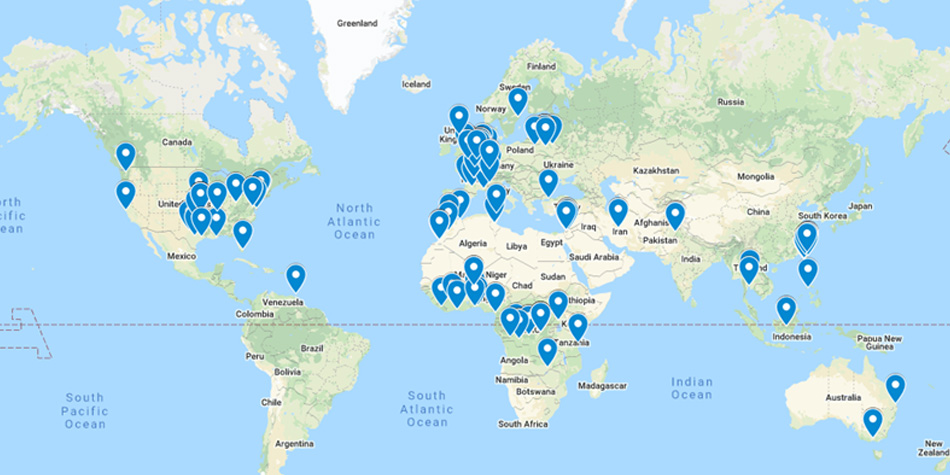
Article(s)
Take Action for World Day 2021!
By World Coalition Against the Death Penalty, on 10 September 2021
Take action now! The 19th World Day Against the Death Penalty is an excellent opportunity to publicly oppose the use of this inhumane punishment and to support those who are fighting for its abolition all over the world.
Drug Offenses
Fair Trial
Warning: Undefined variable $tmp in /home/worldcoa/coalition2020/wp-content/themes/WCADP/template-parts/contents.php on line 27
Women
Document(s)
Poster Hausa 2021 – Ranan Yancin Hukum Cin Kissan Dounia
By World Coalition Against the Death Penalty, on 10 August 2021
2021
Campaigning
Warning: Undefined variable $liste_type_doc in /home/worldcoa/coalition2020/wp-content/themes/WCADP/template-parts/contents-document.php on line 21
Warning: Undefined variable $liste_themes in /home/worldcoa/coalition2020/wp-content/themes/WCADP/template-parts/contents-document.php on line 35
Women
Warning: Undefined variable $tag_langue in /home/worldcoa/coalition2020/wp-content/themes/WCADP/template-parts/contents-document.php on line 85
More details Download [ pdf - 559 Ko ]
Matan da Akama Hukun Cin Raï da Raï : Gaskiyan da Ba’a Gani
- Document type Campaigning
Warning: Undefined variable $liste_pays in /home/worldcoa/coalition2020/wp-content/themes/WCADP/template-parts/contents-document.php on line 107
- Themes list Women
Warning: Undefined variable $lien_langue in /home/worldcoa/coalition2020/wp-content/themes/WCADP/template-parts/contents-document.php on line 127
Document(s)
Poster Zarma 2021 – Jaaro Kan Ika Unndunyara Imatamgan Nda Wiiyen Ciito
By World Coalition Against the Death Penalty, on 10 August 2021
Campaigning
Warning: Undefined variable $liste_type_doc in /home/worldcoa/coalition2020/wp-content/themes/WCADP/template-parts/contents-document.php on line 21
Warning: Undefined variable $liste_themes in /home/worldcoa/coalition2020/wp-content/themes/WCADP/template-parts/contents-document.php on line 35
Women
Warning: Undefined variable $tag_langue in /home/worldcoa/coalition2020/wp-content/themes/WCADP/template-parts/contents-document.php on line 85
More details Download [ pdf - 559 Ko ]
Woyboro Kan Wii Yen Ciiti Ndira a Bon Cimi No Kan Borey Si Nga Ndi
- Document type Campaigning
Warning: Undefined variable $liste_pays in /home/worldcoa/coalition2020/wp-content/themes/WCADP/template-parts/contents-document.php on line 107
- Themes list Women
Warning: Undefined variable $lien_langue in /home/worldcoa/coalition2020/wp-content/themes/WCADP/template-parts/contents-document.php on line 127
Document(s)
Poster TL 2021- Pandaigdigang Araw Laban sa Parusang Kamatayan
on 10 August 2021
Campaigning
Warning: Undefined variable $liste_type_doc in /home/worldcoa/coalition2020/wp-content/themes/WCADP/template-parts/contents-document.php on line 21
Warning: Undefined variable $liste_themes in /home/worldcoa/coalition2020/wp-content/themes/WCADP/template-parts/contents-document.php on line 35
Women
Warning: Undefined variable $tag_langue in /home/worldcoa/coalition2020/wp-content/themes/WCADP/template-parts/contents-document.php on line 85
More details Download [ pdf - 8359 Ko ]
Kababaihang nahatulan ng parusang kamatayan: isang di nakikitang realidad
- Document type Campaigning
Warning: Undefined variable $liste_pays in /home/worldcoa/coalition2020/wp-content/themes/WCADP/template-parts/contents-document.php on line 107
- Themes list Women
Warning: Undefined variable $lien_langue in /home/worldcoa/coalition2020/wp-content/themes/WCADP/template-parts/contents-document.php on line 127
Document(s)
Poster Lunganda 2021 – OLUNAKU LWENSI YONNA LWETUJJUKIRA KAWEFUBBE WO KULWANYISA EKIBONEREZO KYO KUWANIKA ABANTU KU KALABBA
By World Coalition Against the Death Penalty, on 10 August 2021
Campaigning
Warning: Undefined variable $liste_type_doc in /home/worldcoa/coalition2020/wp-content/themes/WCADP/template-parts/contents-document.php on line 21
Warning: Undefined variable $liste_themes in /home/worldcoa/coalition2020/wp-content/themes/WCADP/template-parts/contents-document.php on line 35
Women
Warning: Undefined variable $tag_langue in /home/worldcoa/coalition2020/wp-content/themes/WCADP/template-parts/contents-document.php on line 85
More details Download [ pdf - 8360 Ko ]
OKUWANIKA ABAKAZI KU KALABBA: AMAZIMA AMEKUSIFU
- Document type Campaigning
Warning: Undefined variable $liste_pays in /home/worldcoa/coalition2020/wp-content/themes/WCADP/template-parts/contents-document.php on line 107
- Themes list Women
Warning: Undefined variable $lien_langue in /home/worldcoa/coalition2020/wp-content/themes/WCADP/template-parts/contents-document.php on line 127
Document(s)
Poster Lingala 2021 – Mokolo ya kobundela etumbu ya liwa na mokili mobimba
By World Coalition Against the Death Penalty, on 10 August 2021
Campaigning
Warning: Undefined variable $liste_type_doc in /home/worldcoa/coalition2020/wp-content/themes/WCADP/template-parts/contents-document.php on line 21
Warning: Undefined variable $liste_themes in /home/worldcoa/coalition2020/wp-content/themes/WCADP/template-parts/contents-document.php on line 35
Women
Warning: Undefined variable $tag_langue in /home/worldcoa/coalition2020/wp-content/themes/WCADP/template-parts/contents-document.php on line 85
More details Download [ pdf - 8360 Ko ]
Basi pe bazali kozuwa etumbu ya liwa: Ezali kosalema kasi komonana na miso ya bato te
- Document type Campaigning
Warning: Undefined variable $liste_pays in /home/worldcoa/coalition2020/wp-content/themes/WCADP/template-parts/contents-document.php on line 107
- Themes list Women
Warning: Undefined variable $lien_langue in /home/worldcoa/coalition2020/wp-content/themes/WCADP/template-parts/contents-document.php on line 127
Document(s)
19th World Day Against the Death Penalty – Engaging the Special Procedures of the UN Human Rights Council: Women and the Death Penalty
By World Coalition Against the Death Penalty, Reprieve, FIACAT, The Advocates for Human Rights, on 10 August 2021
Working with...
Warning: Undefined variable $liste_type_doc in /home/worldcoa/coalition2020/wp-content/themes/WCADP/template-parts/contents-document.php on line 21
Warning: Undefined variable $liste_themes in /home/worldcoa/coalition2020/wp-content/themes/WCADP/template-parts/contents-document.php on line 35
Women
Warning: Undefined variable $tag_langue in /home/worldcoa/coalition2020/wp-content/themes/WCADP/template-parts/contents-document.php on line 54
Warning: Undefined variable $lien_langue in /home/worldcoa/coalition2020/wp-content/themes/WCADP/template-parts/contents-document.php on line 55
fr
More details Download [ pdf - 454 Ko ]
While the methods in this tool are applicable beyond the scope of capital punishment, for the 19th World Day Against the Death Penalty, Reprieve and the World Coalition Against the Death Penalty have drafted this How-To on engaging the United Nations (UN) Special Procedures for elevating cases pertaining to women who have been sentenced to the death penalty.
- Document type Working with...
Warning: Undefined variable $liste_pays in /home/worldcoa/coalition2020/wp-content/themes/WCADP/template-parts/contents-document.php on line 107
- Themes list Women
- Available languages Saisir les procédures spéciales du Conseil des droits de l'Homme des Nations unies : les femmes et la peine de mort

Article(s)
Women sentenced to death: An invisible reality
By Advocates for Human Rights, International Federation of ACAT (Action by Christians for the Abolition of Torture), International Harm Reduction Association (IHRA), non-governmental organizations in special consultative status, on 4 August 2021
The World Coalition Against the Death Penalty and supporting member organizations welcome the annual full-day meeting to discuss the human rights of women under resolution 6/30.
2021
Drug Offenses
Fair Trial
Warning: Undefined variable $tmp in /home/worldcoa/coalition2020/wp-content/themes/WCADP/template-parts/contents.php on line 27
Women
Document(s)
Detailed Factsheet: Women and the Death Penalty
By World Coalition Against the Death Penalty, The Advocates for Human Rights, on 1 July 2021
2021
Campaigning
Warning: Undefined variable $liste_type_doc in /home/worldcoa/coalition2020/wp-content/themes/WCADP/template-parts/contents-document.php on line 21
Warning: Undefined variable $liste_themes in /home/worldcoa/coalition2020/wp-content/themes/WCADP/template-parts/contents-document.php on line 35
Women
Warning: Undefined variable $tag_langue in /home/worldcoa/coalition2020/wp-content/themes/WCADP/template-parts/contents-document.php on line 54
Warning: Undefined variable $lien_langue in /home/worldcoa/coalition2020/wp-content/themes/WCADP/template-parts/contents-document.php on line 55
fr
More details Download [ pdf - 534 Ko ]
On 10 October 2021, the World Coalition Against the Death Penalty and other abolitionist organizations worldwide will celebrate the 19th World Day Against the Death Penalty.
This year, the World Day is dedicated to women who risk being sentenced to death, who have received a death sentence, who have been executed, and to those who have had their death sentences commuted, exonerated, or pardoned.
This detailed factsheet will use the phrase “women sentenced to death” as an inclusive phrase for all of these categories. As women represent a small percentage of those on death row globally, very little has been reported about these women. Yet we can learn much by analyzing their crimes, their lives prior to the crimes, and the conditions under which they are detained on death row.
- Document type Campaigning
Warning: Undefined variable $liste_pays in /home/worldcoa/coalition2020/wp-content/themes/WCADP/template-parts/contents-document.php on line 107
- Themes list Women
- Available languages Fiche d'information détaillée: Femmes et la peine de mort
Document(s)
TESTIMONIALS FROM WOMEN SENTENCED TO DEATH
By World Coalition Against the Death Penalty, on 1 July 2021
Campaigning
Warning: Undefined variable $liste_type_doc in /home/worldcoa/coalition2020/wp-content/themes/WCADP/template-parts/contents-document.php on line 21
Warning: Undefined variable $liste_themes in /home/worldcoa/coalition2020/wp-content/themes/WCADP/template-parts/contents-document.php on line 35
Women
Warning: Undefined variable $tag_langue in /home/worldcoa/coalition2020/wp-content/themes/WCADP/template-parts/contents-document.php on line 54
Warning: Undefined variable $lien_langue in /home/worldcoa/coalition2020/wp-content/themes/WCADP/template-parts/contents-document.php on line 55
fr
More details Download [ pdf - 942 Ko ]
Collection of testimonials of women’s experiences around the world regarding their death sentences- World Day 2021
- Document type Campaigning
Warning: Undefined variable $liste_pays in /home/worldcoa/coalition2020/wp-content/themes/WCADP/template-parts/contents-document.php on line 107
- Themes list Women
- Available languages TÉMOIGNAGES DE FEMMES CONDAMNÉES À MORT
Document(s)
PRIMER ON TRANSGENDER INDIVIDUALS FACING THE DEATH PENALTY
By World Coalition Against the Death Penalty; FIACAT; The Advocates for Human Rights; Cornell Center on the DP Worldwide, on 30 June 2021
2021
Campaigning
Warning: Undefined variable $liste_type_doc in /home/worldcoa/coalition2020/wp-content/themes/WCADP/template-parts/contents-document.php on line 21
Warning: Undefined variable $liste_themes in /home/worldcoa/coalition2020/wp-content/themes/WCADP/template-parts/contents-document.php on line 35
Women
Warning: Undefined variable $tag_langue in /home/worldcoa/coalition2020/wp-content/themes/WCADP/template-parts/contents-document.php on line 54
Warning: Undefined variable $lien_langue in /home/worldcoa/coalition2020/wp-content/themes/WCADP/template-parts/contents-document.php on line 55
fr
More details Download [ pdf - 450 Ko ]
On 10 October 2021, the World Coalition Against the Death Penalty and other abolitionist organizations worldwide will celebrate the 19th World Day Against the Death Penalty.
This year the World Day is dedicated to women who risk being sentenced to death, who have received a death sentence, who have been executed, and to those who have had their death sentences commuted, have been exonerated or pardoned. Included in this theme, are trans women and other gender diverse individuals, who are a minority on death row but who are discriminated against on the basis of gender.
Capital punishment disproportionately targets socially marginalized individuals; it is no different for transgender people, who may face discrimination in every aspect of their lives.
- Document type Campaigning
Warning: Undefined variable $liste_pays in /home/worldcoa/coalition2020/wp-content/themes/WCADP/template-parts/contents-document.php on line 107
- Themes list Women
- Available languages FICHE D’INTRODUCTION SUR LES PERSONNES TRANS PASSIBLES DE LA PEINE DE MORT
Document(s)
FACTS AND FIGURES 2020/2021
By World Coalition Against the Death Penalty, on 30 June 2021
Campaigning
Warning: Undefined variable $liste_type_doc in /home/worldcoa/coalition2020/wp-content/themes/WCADP/template-parts/contents-document.php on line 21
Warning: Undefined variable $liste_themes in /home/worldcoa/coalition2020/wp-content/themes/WCADP/template-parts/contents-document.php on line 35
Terrorism
Women
Warning: Undefined variable $tag_langue in /home/worldcoa/coalition2020/wp-content/themes/WCADP/template-parts/contents-document.php on line 54
Warning: Undefined variable $lien_langue in /home/worldcoa/coalition2020/wp-content/themes/WCADP/template-parts/contents-document.php on line 55
fr
More details Download [ pdf - 196 Ko ]
2020/2021 Facts & Figures Sheet for the World Day Against the Death Penalty
- Document type Campaigning
Warning: Undefined variable $liste_pays in /home/worldcoa/coalition2020/wp-content/themes/WCADP/template-parts/contents-document.php on line 107
- Themes list Terrorism / Women
- Available languages FAITS ET CHIFFRES 2020/2021

Article(s)
Program of the 18 June 2021 General Assembly
By World Coalition Against the Death Penalty, on 15 June 2021
If you are a member organization, join the fantastic program we will have on Friday 18 June!
2021
Warning: Undefined variable $tmp in /home/worldcoa/coalition2020/wp-content/themes/WCADP/template-parts/contents.php on line 27
Juveniles
Women
Document(s)
2021 General Assembly of the World coalition against the death penalty – Program
By World Coalition Against the Death Penalty, on 15 June 2021
World Coalition
Warning: Undefined variable $liste_type_doc in /home/worldcoa/coalition2020/wp-content/themes/WCADP/template-parts/contents-document.php on line 21
Warning: Undefined variable $liste_themes in /home/worldcoa/coalition2020/wp-content/themes/WCADP/template-parts/contents-document.php on line 35
Juveniles
Women
Warning: Undefined variable $tag_langue in /home/worldcoa/coalition2020/wp-content/themes/WCADP/template-parts/contents-document.php on line 54
Warning: Undefined variable $lien_langue in /home/worldcoa/coalition2020/wp-content/themes/WCADP/template-parts/contents-document.php on line 55
fr
More details Download [ pdf - 280 Ko ]
If you are a member organization, join the fantastic program we will have on Friday 18 June!
- Document type World Coalition
Warning: Undefined variable $liste_pays in /home/worldcoa/coalition2020/wp-content/themes/WCADP/template-parts/contents-document.php on line 107
- Themes list Juveniles / Women
- Available languages Assemblée générale du 18 juin 2021 - Programme
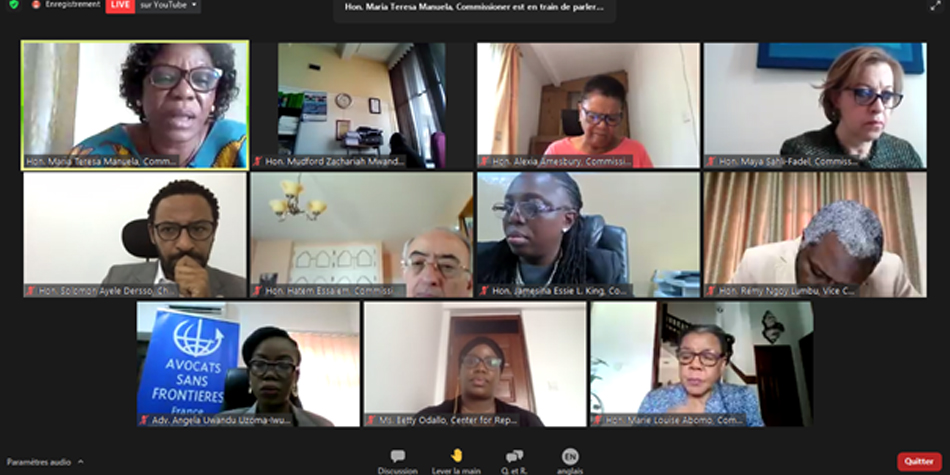
Article(s)
68e session ordinaire de la Commission africaine des droits de l’homme et des peuples – Le plaidoyer contre la peine de mort se poursuit
By Bronwyn Dudley, on 11 June 2021
La CADHP (Commission Africaine des Droits de l’Homme et des Peuples) s’est réunie virtuellement pour sa 68ème session ordinaire du 14 avril au 4 mai 2021.
2021
Women
Terrorism
Terrorism
Women

Article(s)
68th Ordinary Session African Commission on Human & Peoples’ Rights- Anti-Death Penalty Advocacy Continues
By Bronwyn Dudley, on 11 June 2021
The ACHPR (the African Commission on Human and Peoples’ Rights) met virtually for its 68th Ordinary Session from 14 April – 4 May 2021.
Terrorism
Women
Document(s)
Poster SWA – 2021 World Day Against the Death Penalty
By World Coalition Against the Death Penalty, on 10 June 2021
2021
Campaigning
Warning: Undefined variable $liste_type_doc in /home/worldcoa/coalition2020/wp-content/themes/WCADP/template-parts/contents-document.php on line 21
Warning: Undefined variable $liste_themes in /home/worldcoa/coalition2020/wp-content/themes/WCADP/template-parts/contents-document.php on line 35
Women
Warning: Undefined variable $tag_langue in /home/worldcoa/coalition2020/wp-content/themes/WCADP/template-parts/contents-document.php on line 85
More details Download [ pdf - 8373 Ko ]
Wanawake waliohukumiwa kunyongwa: Ukweli uliofichika
- Document type Campaigning
Warning: Undefined variable $liste_pays in /home/worldcoa/coalition2020/wp-content/themes/WCADP/template-parts/contents-document.php on line 107
- Themes list Women
Warning: Undefined variable $lien_langue in /home/worldcoa/coalition2020/wp-content/themes/WCADP/template-parts/contents-document.php on line 127
Document(s)
Poster JPN – 2021 World Day Against the Death Penalty
By World Coalition Against the Death Penalty, on 10 June 2021
Campaigning
Warning: Undefined variable $liste_type_doc in /home/worldcoa/coalition2020/wp-content/themes/WCADP/template-parts/contents-document.php on line 21
Warning: Undefined variable $liste_themes in /home/worldcoa/coalition2020/wp-content/themes/WCADP/template-parts/contents-document.php on line 35
Women
Warning: Undefined variable $tag_langue in /home/worldcoa/coalition2020/wp-content/themes/WCADP/template-parts/contents-document.php on line 85
More details Download [ pdf - 8372 Ko ]
死刑を科された女性:その知られざる現実
- Document type Campaigning
Warning: Undefined variable $liste_pays in /home/worldcoa/coalition2020/wp-content/themes/WCADP/template-parts/contents-document.php on line 107
- Themes list Women
Warning: Undefined variable $lien_langue in /home/worldcoa/coalition2020/wp-content/themes/WCADP/template-parts/contents-document.php on line 127
Document(s)
Poster DE – 2021 World Day Against the Death Penalty
By World Coalition Against the Death Penalty, on 10 June 2021
Campaigning
Warning: Undefined variable $liste_type_doc in /home/worldcoa/coalition2020/wp-content/themes/WCADP/template-parts/contents-document.php on line 21
Warning: Undefined variable $liste_themes in /home/worldcoa/coalition2020/wp-content/themes/WCADP/template-parts/contents-document.php on line 35
Women
Warning: Undefined variable $tag_langue in /home/worldcoa/coalition2020/wp-content/themes/WCADP/template-parts/contents-document.php on line 85
More details Download [ pdf - 8373 Ko ]
Frauen in der Todeszelle: Ungesehene Realität
- Document type Campaigning
Warning: Undefined variable $liste_pays in /home/worldcoa/coalition2020/wp-content/themes/WCADP/template-parts/contents-document.php on line 107
- Themes list Women
Warning: Undefined variable $lien_langue in /home/worldcoa/coalition2020/wp-content/themes/WCADP/template-parts/contents-document.php on line 127
Document(s)
Poster IT – 2021 World Day Against the Death Penalty
By World Coalition Against the Death Penalty, on 10 June 2021
Campaigning
Warning: Undefined variable $liste_type_doc in /home/worldcoa/coalition2020/wp-content/themes/WCADP/template-parts/contents-document.php on line 21
Warning: Undefined variable $liste_themes in /home/worldcoa/coalition2020/wp-content/themes/WCADP/template-parts/contents-document.php on line 35
Women
Warning: Undefined variable $tag_langue in /home/worldcoa/coalition2020/wp-content/themes/WCADP/template-parts/contents-document.php on line 85
More details Download [ pdf - 8373 Ko ]
Donne condannate a morte: una realta’ invisibile
- Document type Campaigning
Warning: Undefined variable $liste_pays in /home/worldcoa/coalition2020/wp-content/themes/WCADP/template-parts/contents-document.php on line 107
- Themes list Women
Warning: Undefined variable $lien_langue in /home/worldcoa/coalition2020/wp-content/themes/WCADP/template-parts/contents-document.php on line 127
Document(s)
Leaflet World Day Against the Death Penalty 2021 – EN
By World Coalition Against the Death Penalty, on 10 June 2021
Campaigning
Warning: Undefined variable $liste_type_doc in /home/worldcoa/coalition2020/wp-content/themes/WCADP/template-parts/contents-document.php on line 21
Warning: Undefined variable $liste_themes in /home/worldcoa/coalition2020/wp-content/themes/WCADP/template-parts/contents-document.php on line 35
Women
Warning: Undefined variable $tag_langue in /home/worldcoa/coalition2020/wp-content/themes/WCADP/template-parts/contents-document.php on line 54
Warning: Undefined variable $lien_langue in /home/worldcoa/coalition2020/wp-content/themes/WCADP/template-parts/contents-document.php on line 55
arfr
More details Download [ pdf - 652 Ko ]
On 10 October 2021, the World Coalition Against the Death Penalty and abolitionist organizations around the world will celebrate the 19th World Day Against the Death Penalty.
This year the World Day is dedicated to women who risk being sentenced to death, who have received a death sentence, who have been executed, and to those who have had their death sentences commuted, have been exonerated or pardoned.
Their stories are an invisible reality.
- Document type Campaigning
Warning: Undefined variable $liste_pays in /home/worldcoa/coalition2020/wp-content/themes/WCADP/template-parts/contents-document.php on line 107
- Themes list Women
- Available languages كتيب باللغة العربية - الدورة التاسعة عشرة للیوم العالمي لمناھضة عقوبة الإعدامBrochure FR - 2021 Journée mondiale contre la peine de mort
Document(s)
Poster EN – 2021 World Day Against the Death Penalty
By World Coalition Against the Death Penalty, on 10 June 2021
Campaigning
Warning: Undefined variable $liste_type_doc in /home/worldcoa/coalition2020/wp-content/themes/WCADP/template-parts/contents-document.php on line 21
Warning: Undefined variable $liste_themes in /home/worldcoa/coalition2020/wp-content/themes/WCADP/template-parts/contents-document.php on line 35
Women
Warning: Undefined variable $tag_langue in /home/worldcoa/coalition2020/wp-content/themes/WCADP/template-parts/contents-document.php on line 54
Warning: Undefined variable $lien_langue in /home/worldcoa/coalition2020/wp-content/themes/WCADP/template-parts/contents-document.php on line 55
aresfafrruzh-hant
More details Download [ pdf - 8373 Ko ]
Women sentenced to death: an invisible reality.
- Document type Campaigning
Warning: Undefined variable $liste_pays in /home/worldcoa/coalition2020/wp-content/themes/WCADP/template-parts/contents-document.php on line 107
- Themes list Women
- Available languages 2021اليوم العالمي ضدّ عقوبة الاعدامPoster ES - 2021 Día Mundial contra la Pena de Muerte2021روز جهانی علیه مجازات مرگAffiche FR - 2021 Journée mondiale contre la peine de mortPoster RU- 2021 Всемирный день против смертной казниPoster ZH 2021- 世界反死刑日
Document(s)
Mobilization Kit World Day 2021
By World Coalition Against the Death Penalty, on 10 June 2021
Campaigning
Warning: Undefined variable $liste_type_doc in /home/worldcoa/coalition2020/wp-content/themes/WCADP/template-parts/contents-document.php on line 21
Warning: Undefined variable $liste_themes in /home/worldcoa/coalition2020/wp-content/themes/WCADP/template-parts/contents-document.php on line 35
Women
Warning: Undefined variable $tag_langue in /home/worldcoa/coalition2020/wp-content/themes/WCADP/template-parts/contents-document.php on line 54
Warning: Undefined variable $lien_langue in /home/worldcoa/coalition2020/wp-content/themes/WCADP/template-parts/contents-document.php on line 55
arfrzh-hant
More details Download [ pdf - 847 Ko ]
The World Day Against the Death Penalty is aimed at political leaders and public opinion in both retentionist and abolitionist countries.
For the 19th year in a row, the World Coalition Against the Death Penalty is calling for local initiatives and world-wide actions that shine a spotlight on the abolition of the death penalty.
The goal of this Mobilization Kit is to inform of this year’s objectives as well provide ideas of activities that boost the global abolitionist goal. This year the World Day is dedicated to women who risk being sentenced to death, who have received a death sentence, who have been executed, and to those who have had their death sentences commuted, have been exonerated or pardoned.
- Document type Campaigning
Warning: Undefined variable $liste_pays in /home/worldcoa/coalition2020/wp-content/themes/WCADP/template-parts/contents-document.php on line 107
- Themes list Women
- Available languages رزمة التعبئةKit de mobilisation Journée mondiale 2021動員資料包
Document(s)
Extending borders of knowledge: gendered pathways to prison in Thailand for international cross border drug trafficking
By Samantha Jeffries, Prarthana Rao, Chontit Chuenurah, Michelle Fitz-Gerald, on 26 May 2021
2021
Academic Article
Warning: Undefined variable $liste_type_doc in /home/worldcoa/coalition2020/wp-content/themes/WCADP/template-parts/contents-document.php on line 21
Warning: Undefined variable $liste_themes in /home/worldcoa/coalition2020/wp-content/themes/WCADP/template-parts/contents-document.php on line 35
Drug Offenses
Gender
Warning: Undefined variable $liste_pays in /home/worldcoa/coalition2020/wp-content/themes/WCADP/template-parts/contents-document.php on line 40
Thailand
Women
Warning: Undefined variable $tag_langue in /home/worldcoa/coalition2020/wp-content/themes/WCADP/template-parts/contents-document.php on line 85
More details See the document
This study compares the prison trajectories of women and men involved in international cross-border drug trafficking (ICBDT) in Thailand, identifying shared and gendered pathways, including a unique romantic susceptibility trajectory for women.
- Document type Academic Article
- Countries list Thailand
- Themes list Drug Offenses / Gender / Women
Warning: Undefined variable $lien_langue in /home/worldcoa/coalition2020/wp-content/themes/WCADP/template-parts/contents-document.php on line 127
Document(s)
No one is spared – The widespread use of the death penalty in Iran
By League for the Defence of Human Rights in Iran, on 5 November 2020
2020
Warning: Undefined variable $liste_themes in /home/worldcoa/coalition2020/wp-content/themes/WCADP/template-parts/contents-document.php on line 35
Drug Offenses
Fair Trial
Warning: Undefined variable $liste_pays in /home/worldcoa/coalition2020/wp-content/themes/WCADP/template-parts/contents-document.php on line 40
Iran (Islamic Republic of)
Juveniles
Women
Warning: Undefined variable $tag_langue in /home/worldcoa/coalition2020/wp-content/themes/WCADP/template-parts/contents-document.php on line 85
More details See the document
- Document type Array
- Countries list Iran (Islamic Republic of)
- Themes list Drug Offenses / Fair Trial / Juveniles / Women
Warning: Undefined variable $lien_langue in /home/worldcoa/coalition2020/wp-content/themes/WCADP/template-parts/contents-document.php on line 127
Warning: Array to string conversion in /home/worldcoa/coalition2020/wp-content/themes/WCADP/template-parts/contents-document.php on line 105

Article(s)
75th UN General Assembly High-Level Event Focuses on the Gender Dimension of the Death Penalty
By Gia Tongson, on 6 October 2020
On September 24th, the UN Permanent Mission of Italy, the European Union, and Amnesty International, in cooperation with the UN Office of the High Commissioner on Human Rights (OHCHR) and UN Women, held a high-level virtual event that shed light on the gender dimension of the death penalty. The webinar was conducted as part of […]
2020
Death Row Conditions
Fair Trial
Women
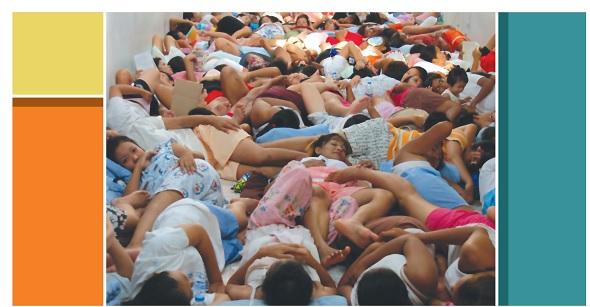
Article(s)
Global overview of women facing the death penalty
By Cornell Center on the Death Penalty Worldwide and World Coalition, on 10 October 2018
Launch of a groundbreaking report entitled “Judged for more than her crime: A Global Study on Women Facing the Death Penalty”
2018
Women

Article(s)
Improved access to unique global death penalty library
By Thomas Hubert, on 10 July 2014
The World Coalition has redesigned its online library to help visitors find the documents they need in its multilingual database of resources and campaigning tools on capital punishment.
2014
Clemency
Cruel, Inhuman and Degrading Treatment and Punishment
Death Row Conditions
Drug Offenses
Fair Trial
Innocence
Intellectual Disability
Juveniles
Legal Representation
Mental Illness
Moratorium
Murder Victims' Families
Public Opinion
Terrorism
Women

Article(s)
Texas maintains distance from abolitionist trend after 500th execution
By Léa Macarez, on 4 July 2013
52 year-old black woman Kimberly McCarthy was executed on 26 June and became the 500th prisoner put to death since Texas restored the death penalty in 1982.
2013
United States
Women
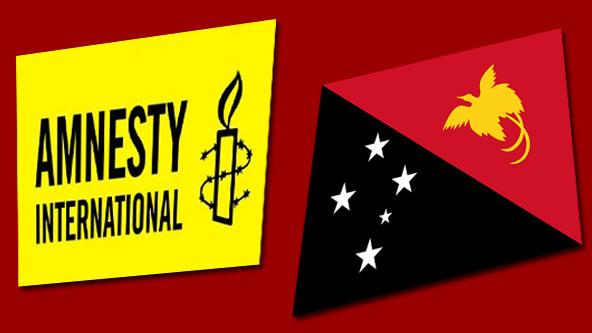
Article(s)
Death penalty proposals put lives at risk
on 23 May 2013
At least ten people under sentence of death will be at risk of execution if legal amendments to facilitate the resumption of executions are passed in Papua New Guinea.
2013
Papua New Guinea
Women
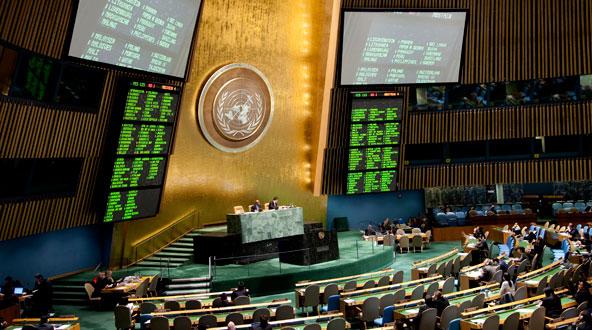
Article(s)
World’s nations call for execution freeze
By Maria Donatelli, on 20 December 2012
The World Coalition Against the Death Penalty welcomes the adoption by a growing number of United Nations member States of a fourth resolution calling for a universal moratorium on the use of the death penalty.
2012
Bahrain
Central African Republic
Chad
Dominica
Juveniles
Maldives
Moratorium
Oman
Papua New Guinea
Seychelles
Sierra Leone
South Sudan
Sri Lanka
Tunisia
Women
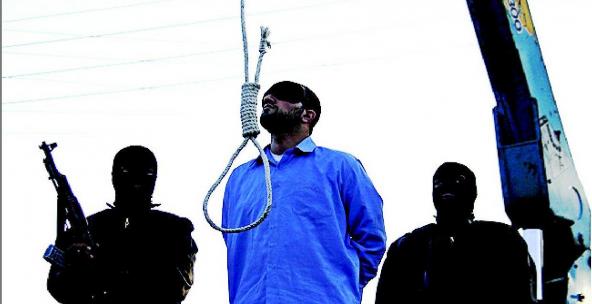
Article(s)
Highest execution numbers in Iran in 10 years
By Mahmood Amiry-Moghaddam, on 13 March 2012
Iran Human Rights has published its annual report on the death penalty in Iran in 2011. IHR’s international spokesperson Mahmood Amiry-Moghaddam says the Iranian authorities are keeping the number of executions high because they use the death penalty as a political tool.
2012
Drug Offenses
Iran (Islamic Republic of)
Juveniles
Women
Article(s)
“Academics can enable activists with technology”
on 28 February 2010
Luis Arroyo Zapatero is the head of the Institute for European and International law at the University of Castilla-La-Mancha. In 2009, he kick-started the foundation of the International Academic Network for the Abolition of Capital Punishment.
2010
Moratorium
Women
Article(s)
Protecting vulnerable groups from the death penalty
on 24 February 2010
Juveniles and the mentally ill face a higher risk of falling victims to the death penalty. Abolitionists and activists defending their rights have teamed up to highlight this situation.
2010
Drug Offenses
Iran (Islamic Republic of)
Juveniles
Mental Illness
Switzerland
Women
Article(s)
Fear of mass executions in Iraq
on 4 January 2010
Information obtained by the World Coalition suggests that the Iraqi authorities have been planning the mass execution of nearly 1,000 people. In a column offered to international newspapers, the World Coalition denounces that barbaric plan.
2010
Clemency
Iraq
Iraq
Women
Article(s)
Spain and world academics join forces against the death penalty
on 22 December 2009
Spanish President José Luis Zapatero attended the international abolitionist colloquium during which the Academic Network against the Death Penalty was launched.
2009
Benin
Chile
France
Mental Illness
Spain
Women
Article(s)
Saudi Arabia: why are foreigners losing their heads?
on 26 March 2008
Rizana Nafeek, a Sri Lankan servant sentenced to death by a Saudi court, is facing decapitation. ACAT-France and ECPM have joined forces to defend poor immigrants at risk of capital punishment in Saudi Arabia.
2008
Fair Trial
Juveniles
Legal Representation
Saudi Arabia
Women
Article(s)
Nie Shubin: a victim of the arbitrary in China
on 21 January 2008
In the lead up to the Beijing Olympics, the French coalition Collectif Chine JO 2008 highlights cases of human rights abuse in China on a weekly basis. This week, they focus on Nie Shubin, who was executed by mistake in 1995.
2008
China
Cruel, Inhuman and Degrading Treatment and Punishment
Women
Article(s)
International mobilisation saves the life of Filipina maid
on 12 December 2007
A Filipina woman sentenced to death in Kuwait for the murder of her employer has seen her sentence commuted to life imprisonment after joint action by migrant and abolitionist groups.
2007
Kuwait
Philippines
Women
Article(s)
Human Rights and the Death Penalty in Iran
on 19 June 2007
A gathering has taken place in Geneva on June 11, 2007 to protest against human rights violations in Iran. On the initiative of Human Rights in Iran, this demonstration was supported by Hands Off Caïn, the International Committee against Torture, Rights & Democracy, and the Canadian Center for the Victims of Torture (CCVT), among others.
2007
Cruel, Inhuman and Degrading Treatment and Punishment
Iran (Islamic Republic of)
Juveniles
Women
Article(s)
Moving towards an inter-Arab coalition against the death penalty
on 1 May 2007
As of today, no country in North Africa and the Middle-East has yet abolished the death penalty. However, there are positive signs that the region is now ready to debate the issue – as can be seen from the profusion of discussions and exchanges that took place during the 3 rd World Congress against the Death Penalty.
2007
Public Opinion
Women

